标签:des style blog http color strong
A method for optimizing the throughput of TCP/IP applications by aggregating user application data and consolidating multiple TCP/IP connection streams into a single optimized stream for delivery to a destination application. Optimization of the internet protocol uses a packet interceptor to intercept packets from a source application, a packet driver to aggregate the intercepted packets, a data mover to transport the aggregated packets to another data mover at the destination, a destination packet driver to disaggregate the transported aggregated packets, and a destination end processor to deliver the disaggregated IP packets to the destination application.
FIELD OF TECHNOLOGY
The technology described in this specification relates to data communication protocols for optimizing the end-to-end throughput of data transported over TCP/IP networks.
BACKGROUND
Internet Protocol (IP) networks are ubiquitous and their use continues to expand. Moreover, the need for fast transfer of large amounts of data over IP networks is also expanding. For example, businesses must ensure that their operations remain up and running during a disaster. This often requires transfer of the business‘ data over IP networks for storage at a remote site. In examples such as this, large amounts of data are transferred and the transfer must be done at high speed to minimize the cost for use of the transport media, such as coaxial cable, fiber cable, and microwave links. However, TCP/IP was not designed to efficiently handle fast transfer of large blocks of data; it was designed to handle small packets in low latency networks.
The embodiments of the technology presented in this specification disclose a process and apparatus for optimization of data transfer over an IP network. The embodiments of the internet protocol optimizer enhances the performance of IP applications without requiring any changes to the user‘s applications or tuning of the platform on which the applications are running.
The embodiments described are often referred to as the "transport protocol optimizer" or as the "TPO." This is not meant to limit the technology claimed in the specification. It is meant to be a general reference, the purpose of which is to make the specification more readable and understandable.
The transport protocol optimizer is a network enhancement of IP application performance when running over high-speed IP networks. The transport protocol optimizer enhances performance by (a) overcoming the effects of long distance (latency) on TCP/IP traffic, (b) compressing data at the block level, and (c) shielding TCP applications from variations in circuit conditions that may be occasional, but are often disruptive such as latency, jitter, bit error rate, distance, and bandwidth.
An embodiment of the internet protocol optimizer uses Linux-based software to enhance business continuity application performance when running over long-distance IP networks. The TPO may be implemented as a network appliance on a standard Intel platform. It may, however, be ported to different operating systems or computer platforms, such as a blade in a storage controller or switching platform. Use of the internet protocol optimizer for data replication and/or data mirroring of corporate mission critical, high-volume data is best transported over corporate private IP (intranet) networks, rather than over public IP (internet) networks.
Except in a few instances, embodiments of the TPO are described in the form of independent network appliances. Nevertheless, the TPO is not limited to this implementation. A person of ordinary skill in the art of data communications and computer technology can readily implement the TPO in other embodiments, including in a software only version running on an application server, a network switch, or other computing device.
Several characteristics of TCP/IP cause it to perform poorly over long distances. These are, for example, its (a) window size, (b) acknowledgement scheme, (c) slow start, and (d) session free-for-all.
Window Size. To utilize the full available bandwidth of a data session, enough data must be sent to "fill the pipe". The amount of data that can be "in the air" at any point in time is governed by the window sizing capability of the TCP stack and the applications. Most TCP implementations support a feature called window scaling, which does allow large windows to be used. However, each TCP implementation may implement this feature differently, use a different default for setting the initial size, or in some cases, may not even support it. At best case, it then becomes up to the user to tune the TCP stack, and possibly even the TCP applications in order to enable this capability. In many organizations, this may not be a viable option. Another disadvantage of using window scaling is that it may apply to all applications running on that particular server, when in fact, the desire might be to only selectively enable this feature for a particular application. Also, with window scaling enabled, the window may still not be large enough, or the server or application may not have enough buffer space available to support the capacity of the network. For example, the total round-trip time for a 3000 mile connection is approximately 60 milliseconds, creating an available data "pipe" at 100 Megabits per second (Mbps) of 750 Kilobytes. A satellite connection (540 milliseconds round-trip time) at 45 Mbps creates a 3 Megabyte pipe. If window scaling is not implemented, or is not tuned to the network requirements, there may still be a large amount of "empty pipe". In contrast, the TPO window size is dynamically tuned, independent of any application TCP stack capability, and keeps the available network bandwidth pipe full, resulting in more efficient utilization and minimizing the "empty pipe" situation.
Acknowledgement Scheme. The TCP acknowledgement scheme may cause the entire stream from any lost portion to be retransmitted in its entirety. In high packet loss/bit-error-rate (BER) scenarios this can cause large amounts of bandwidth to be wasted in resending data that has already been successfully received, all with the long latency time of the communication path. Unlike the TCP acknowledgement scheme, the TPO‘s acknowledgement scheme retransmits only segments that have not been positively acknowledged, and not all the subsequent segments that have already been successfully sent.
Slow Start. TCP data transfers start slowly to avoid congestion due to possible large numbers of sessions competing for the bandwidth and ramp-up to their maximum transfer rate, resulting in poor performance for short sessions. However, the TPO startup configuration parameters allow transmissions to start at a close approximation of the available session bandwidth. Dynamic adjustments, based on feedback from the receiver in the acknowledgement protocol, quickly "zero-in" on the appropriate send rate for current conditions.
Session Free For All. Each TCP session is throttled and contends for network resources independently ("session free-for-all"), which can cause over-subscription of resources relative to each individual session. But, the TPO‘s session pipeline allows traffic from multiple TCP sessions to be aggregated over a smaller set of connections between TPOs, enabling a more efficient use of the bandwidth and less protocol overhead than acknowledging many small messages for individual connections.
An embodiment of the TPO comprises: (a) an IP packet interceptor, which intercepts the IP packets and reroutes the IP packets over the TPO network; (b) one or more edge processors, which interface the IP-packet interceptor and the packet driver and interface the IP-packet interceptor and the TCP/IP application; (c) a packet driver, which aggregates the IP packets for optimization of their transmission over a communication path; (d) a compression engine, which compresses the data prior to delivery over the TPO connection and decompresses it after delivery; (e) a data mover, which provides the transport protocol that is used for delivery of the optimized TPO packets;
DESCRIPTION OF EMBODIMENTS
The TPO accelerates selected IP traffic over a wide area network. Participating servers and/or IP-enabled storage controllers direct IP traffic to the TPO in a gateway or proxy mode. The gateway mode is enabled by configuring a static route in each of the application servers or storage controllers. The static route specifies the local TPO as the gateway for the destination server‘s or storage controller‘s IP address. The proxy mode is enabled by configuring an additional IP address on the TPO to act as a "proxy" address for the real IP address of the destination server or storage controller. Proxy mode is typically easier to deploy, but consumes additional IP addresses.
The TPO selects packets for optimization based on a set of filtering criteria, which comprises the source IP address and port number, the destination IP address and port number, and the protocol type (sometimes referred to in this specification as the "quintuple"). Selected packets are aggregated and sent over the TPO connection using a protocol (the "data mover" protocol) that is optimized for achieving better performance over a wide area network. Non-selected packets are returned to the IP stack and follow the IP routing rules in effect. Typically the non-selected packets will still reach the destination, but will not be optimized for high speed transmission over the network. FIG. 21 shows a TCP application?11, which generates TCP/IP packets that are routed to a source TPO?40. The source TPO?40?optimizes the packets, and sends the optimized IP packets over an already established communication path?1520?to a destination TPO?80. (The TPO communication path?1520?is established during TPO initialization). The destination TPO?80?then strips away the optimization encapsulation from the TCP/IP packets and forwards them to the destination TCP application?51. FIG. 21 shows that the TCP connections between the source TCP application?11?and its source TPO?40, and between the destination TCP application?51?and its destination TPO?80?are each maintained locally. The routes used by the application servers are static. The actual connection between the TPOs, however, is a UDP connection. TPO is designed to be transparent to the network application. The behavior of the application remains unchanged. Whether the application was designed to operate on a peer-to-peer level or a client/server level, it continues to function in that manner over the TPO. The application is not aware that the packets are intercepted and rerouted. When the packets are received by the destination application, they look the same as if they had not been intercepted by the TPO.
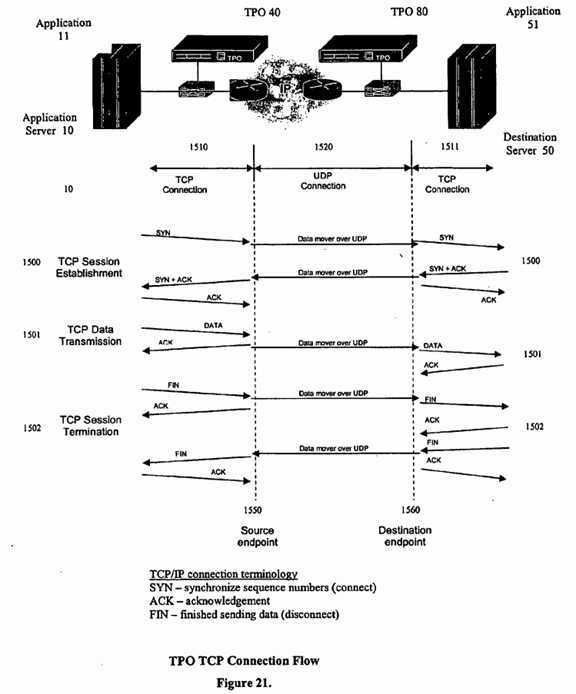
The performance gains achieved by the TPO are due to reduced latency on the network. By performing more optimal transmissions and acknowledgements of buffers, the number of round-trip hops on the network are reduced, thus reducing the time required to send data. Because of the latency reduction, the greatest performance gain is usually achieved in situations that require sending large amounts of data over long distances.
The TPO is a process and/or an apparatus for enhancing the throughput of Transmission Control Protocol/Internet Protocol (TCP/IP) applications. It increases the performance of TCP/IP applications. It achieves this by (a) intercepting IP packets generated by an application running on a server computer (or on any computer) and (b) placing the data in buffers for subsequent delivery over a UDP communication path (which is usually established prior to the interception process) between two TPOs. The application running on a server computer is connected to a Local Area Network (LAN). If the local application uses the Transport Control Protocol (TCP), that connection is terminated by the TPO that resides on the same network segment as the local application server. Packet interception and UDP delivery is performed without the originating TCP/IP application being aware of this redirection. Upon reaching the destination TPO, the intercepted packet data is removed from the destination UDP buffer and delivered to the destination server. If the intercepted source application is a TCP connection, then an independent TCP connection is established between the destination TPO and the destination application executing on the destination server.
The terms "originating," "source," "sending," "transmitting," or "local" as descriptors for application, server, TPO, switch, router, LAN, or other such thing are used interchangeably in this specification. The terms "destination," "receiving," or "remote" as descriptors for application, server, TPO, switch, router, LAN, or other such thing are also used interchangeably in this specification. In this specification the embodiments will usually be described in a configuration where the server is connected to LAN.
For maximum optimization, the TPO connection normally exists over a Wide Area Network (WAN), although this is not a requirement. A TPO connection may exist over any type of IP data communications network.
A fiber or copper gigabit Ethernet (GbE) Network Interface Card (NIC) is used to interface the TPO with the network. Optionally, another copper GbE NIC can be used as a TPO management interface.
The embodiments of the TPO describe implementations that intercept TCP, UDP, or ICMP protocol IP packets. However, the TPO may be configured to use other TCP/IP protocols by a person of ordinary skill in the art of data communication software protocols. Although the term "TCP" is used throughout this specification, it is meant in a broader sense to mean any TCP/IP protocol.
An aspect of an embodiment of the TPO includes a command interface that provides a data and statistics display capability, as well as the ability to modify operating parameters and configuration data.
Another aspect is a Web browser for submission of selected TPO and data mover configuration and display commands from any workstation with a browser and network access to the TPO. Password protection is employed by requiring a password to do any command that changes the environment. An additional level of password protection can be employed by also requiring a password for display access. Sample browser screen images are shown in FIG. 10, FIG. 11, and FIG. 12.
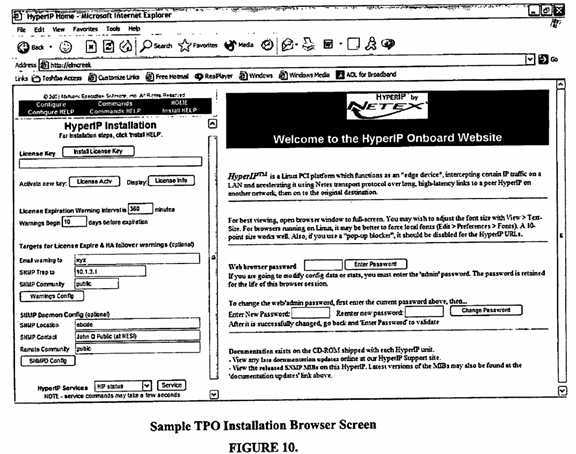
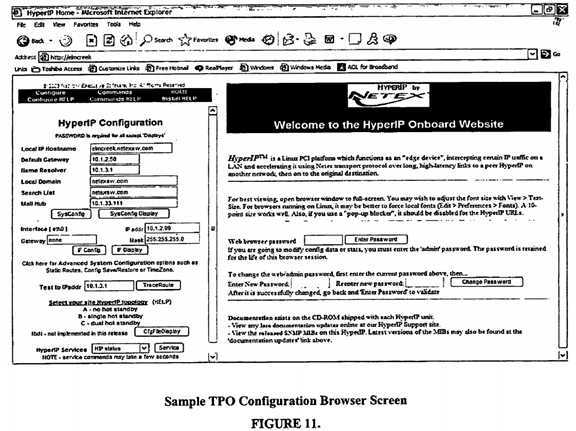
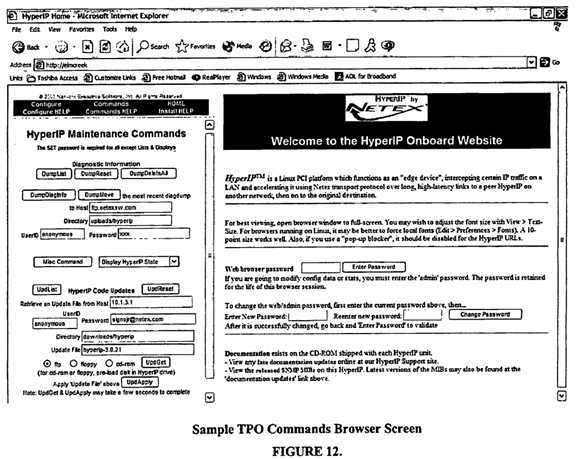
FIGS. 1A, 1B, and?1C illustrate a configuration of a source LAN, a WAN?90?communication path?91, and a destination LAN. FIG. 1A depicts the location of an embodiment of source TPO?40?and destination TPO?80?in an end-to-end configuration. In this embodiment TPOs?40?and?80?are stand-alone units (also referred to in this specification as appliances). Each appliance includes a TPO hardware unit with TPO software residing within it. FIG. 1B illustrates another embodiment of source TPO?40?and destination TPO?80?in an end-to-end configuration. In this embodiment TPOs?40?and?80?are implemented in software only. The TPO software resides on host application servers?10?and?50. FIG. 1C illustrates a further embodiment of TPOs?40?and?80?in an end-to-end configuration. In this embodiment source and destination TPOs?40?and?80?are each implemented on a network component, shown here as network switches?20?and?60.
FIGS. 1A, 1B, and?1C use the terms network router and network switch to refer to standard networking components. These components are typically an integral part of all networking infrastructures. They are readily available from many different network component vendors. Throughout this specification the term TPO will be used to refer to one of the TPOs or both of the pair of TPOs. The technology described in this specification comprises a TPO for each communicating server.
In FIG. 1A source application server?10?executes a TCP/IP application?11. Source TCP/IP application?11?communicates with another TCP/IP application?51, the destination application, that executes on destination application server?50. Source network switch?20?provides connections to source application server?10?via cable?21, to source network router?30?via cable?22, and to source TPO?40?via cable?24. Collectively, this portion of the network comprises the source LAN. Destination network switch?60?provides connections to destination application server?50?via cable?61, to destination network router?70?via cable?62, and to destination TPO?80?via cable?64. Collectively, this portion of the network comprises the destination LAN. Source LAN is interconnected to destination LAN by the interconnection of source network router?30?to WAN?90?via cable?23?and with destination network router?70?from WAN?90?via cable?63. Data flow through the TPO configuration uses standard IP routing mechanisms. The data generated by source application?11?flows from source application server?10?to (a) source network switch?20, (b) source TPO?40, (c) back to source network switch?20, (d) source network router?30, (e) WAN?90?(or other communication path?91), (f) destination network router?70, (g) destination network switch?60, (h) destination TPO?80, (i) destination network switch?60, (j) destination application server?50, and (k) destination application?51. Data generated by destination application?51?flows in the reverse fashion back to source application?11. However, for purposes of clarity, when data is generated by destination application?51, destination application?51?becomes and is referred to as the source application as are each of its connected components which make up the destination LAN. In this embodiment TPO software runs on a TPO dedicated hardware platform. Collectively the TPO software and the dedicated TPO hardware platform is a TPO appliance. The dedicated hardware platform is optimized to serve the needs of TPO software.
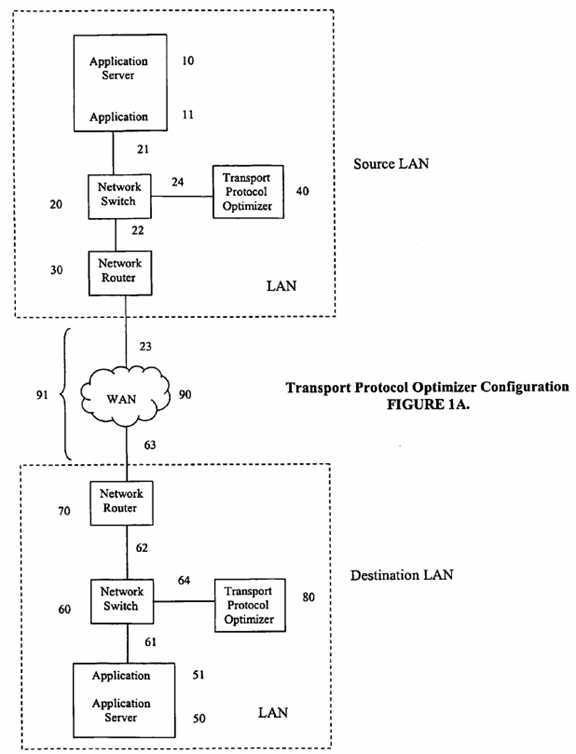
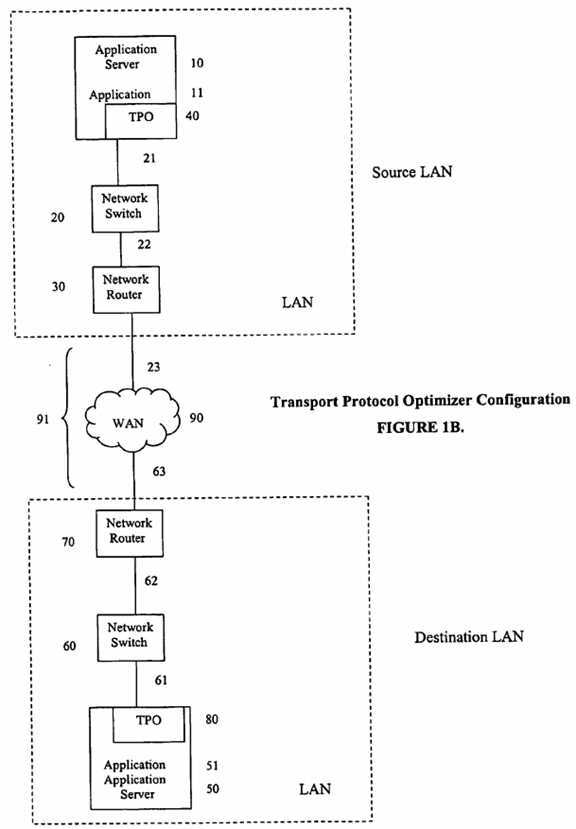
In FIG. 1B source application server?10?is a server on which a TCP/IP application?11?executes and on which a software version of the TPO runs. TCP/IP application?11?communicates with another TCP/IP application?51?that executes on destination application server?50, on which the TPO is implemented. Network switch?20?provides connections to application server?11?with cable?21?and to network router?30?with cable?22. Collectively, this portion of the network comprises the source LAN. Network switch?60?provides connections to application server?50?with cable?61?and to network router?70?with cable?62. Collectively, this portion of the network comprises the destination LAN. Source LAN is interconnected to destination LAN by the interconnection of network router?30?to WAN?90?with cable?23?and with network router?70?to WAN?90?with cable?63. A person of ordinary skill in the art of writing data communication software can implement the TPO in the embodiment represented in FIG. 1B.
In FIG. 1C, application server?10?is a server on which a TCP/IP application?11?executes. Application server?10?communicates with another TCP/IP application?51?that executes on application server?50. Source TPO is integrated into network switches?20?and?60?or it is integrated into a separate server component in the network switches. Such a separate server component is referred to as a blade and is on a board with an edge connector for plugging into the back plane of, for example, the network switches. Network switch?20?provides connections to application server?10?with cable21?and to network router?30?with cable?22. Collectively, this portion of the network comprises the source LAN. Network switch?60?connects to application server?50?with cable?61?and to network router?70?with cable?62. Collectively, this portion of the network comprises the destination LAN. Source LAN is interconnected to destination LAN by the interconnection of network router?30?to the WAN?90?with cable?23?and with network router70?to the WAN?90?with cable?63.
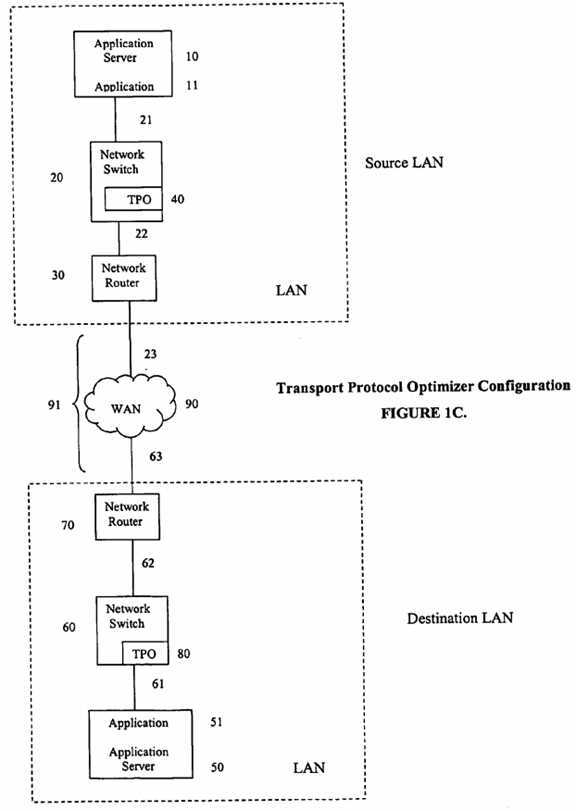
An embodiment of the operation of the TPO process for optimizing IP traffic over a communications link comprises: (a) inserting a TPO into source LAN and another TPO into destination LAN; (b) interconnecting source and destination LANs by a communication path?91; (c) establishing a UDP communication link between source and destination TPOs; (d) directing IP packets (which are generated by a source TCP communication application executing on a source TCP application server on source LAN) to source TPO on source LAN using standard IP routing mechanisms; (e) accepting by the TPO for optimization of only those IP packets that meet a set of address and protocol filtering rules stored in the TPO memory; (f) rerouting of the accepted packets by the TPO while maintaining knowledge of the source IP address, source IP port, destination IP address, destination IP port, and protocol type fields of the rerouted packet; (g) referring to FIG. 21, establishing a connection between the source TCP application?11?and the source TPO?40?by the TPO‘s generation of a source endpoint?1550?(the source endpoint?1550?is a combination of the IP address of source TPO?40?and the port number of an edge process that is created on TPO?40) for the accepted packets (the source endpoint?1550is established when the TPO sends the required TCP/IP protocol to source TCP application?11); (h) aggregating the accepted packet data into the source TPO buffers for subsequent transmission over the TPO communication path?91; (i) transmitting the aggregated data over the TPO communication path?91?(j) providing a reliable data delivery mechanism for the aggregated data sent over communication path?91; (k) receiving the transmitted aggregated data by the destination TPO; (l) disaggregating the received aggregated data by the destination TPO; (m) restoring the source IP address, source IP port, destination IP address, destination IP port, and protocol type fields to the rerouted packets; (n) referring to FIG. 21, establishing a connection between the destination TCP application?51?and the destination TPO?80?by the TPO‘s generation of a destination endpoint?1560?(the destination endpoint?1560?is a combination of the IP address of destination TPO?80?and the port number of an edge process that is created on TPO?80) for the accepted packets (the destination endpoint?1560?is established when the TPO sends the required TCP/IP protocol to the destination TCP application?51); and (o) delivering the packets to the original destination IP address on the destination LAN;
FIG. 21 illustrates the TCP connection flow utilizing the transport protocol optimizer. A TCP/IP connection?1510?is established and maintained between source application?11?executing on source application server?10?and TPO?40. Source application?11?and source endpoint?1550?represent the endpoints of TCP/IP connection?1510. A TCP/IP connection?1511?is established and maintained between destination application?51?executing on destination server?50?and TPO?80. Destination application?51?and destination endpoint?1560?represent the endpoints of TCP/IP connection1511. Standard TCP ‘syn‘ and ‘ack‘ segments result in the 1500 establishment of TCP/IP connections?1510?and?1511. Standard TCP ‘fin‘ and ‘ack‘ segments result in the 1502 termination of TCP/IP connections?1510?and?1511. Standard TCP data segments are used for delivering data on TCP/IP connections?1510?and?1511. Data between source endpoint?1550?and destination endpoint?1560?is delivered over the TPO UDP connection1520.
An embodiment of the TPO is illustrated in FIG. 1D. FIG. 1D is a block level diagram of the TPO architecture. This embodiment of the TPO uses the Linux operating system. It is comprised of five elements: (a) a packet interceptor?270; (b) an edge processor?271; (c) a packet driver?272; (d) a compression engine?273; and (e) a data mover?274. The packet interceptor?270?resides in the Linux kernel space. The edge processor?271, packet driver?272, compression engine?273, and the data mover?274?all reside in the Linux user space.
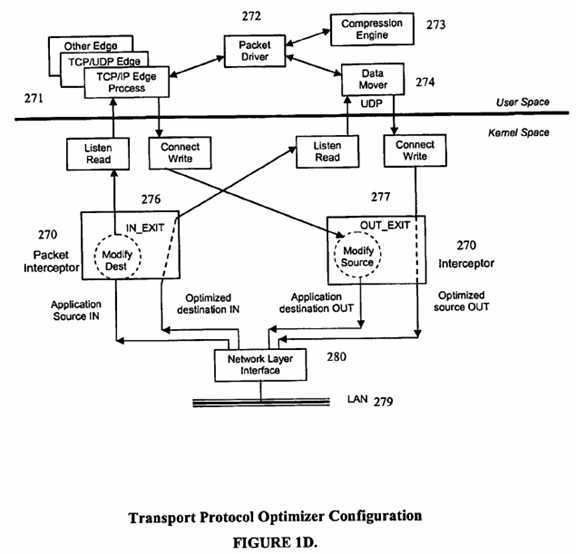
The packet flow through FIG. 1D (illustrated more graphically in FIGS. 13-20) is as follows: (a) a TCP packet arrives from the network on the TPO Network Interface Card; (b) the packet interceptor reads the packet and determines if the packet should be selected for optimization; (c) if the packet should not be selected, the packet continues up the IP stack and follows the IP routing rules defined for this destination IP address; (d) if it should be selected, the original "to" IP address and port number is saved and the packet is modified with the IP address and port number of the source TPO; (e) the packet then continues up the IP stack and is delivered to the TPO; (f) in the TPO an edge process is created to run this connection; (g) the edge process receives every IP packet that is part of this connection; (h) from the edge interface, the packet goes to the packet driver; (i) from the packet driver the packet is aggregated into a buffer; (j) if compression is enabled the aggregated buffer is passed to the compression engine; (k) the compressed aggregated buffer is passed to the data mover; and (l) from the data mover the buffer goes back out the network to the destination TPO using registered TPO port?3919?(or an alternate port defined in a configuration file) and a standard UDP socket interface.
Packet Interceptor. The first of the five elements for optimizing TCP/IP applications is the packet interceptor?270. The packet interceptor selects IP packets and reroutes them. When a message arrives in the IP layer, the kernel-level packet interceptor examines the IP header to determine if it is a message to be selected. Criteria for selection includes: source IP address; source IP port (optional); destination IP address; destination IP port (optional); and protocol type (TCP, UDP, or ICMP). In one embodiment of the TPO, configuring specific IP address pairs for selection is not supported at the User Interface level. By default, "wildcard" definitions are used, which results in the TPO selecting all packets that it receives, from any source IP address and port number, and destined to any IP address and port number (provided the packet is either TCP, UDP, or ICMP protocol type). In another embodiment of the TPO, configuring specific IP address pairs for selection is supported at the User Interface level. The TPO can be configured to intercept specific IP address pairs, or it can be configured to use different "wildcard" definitions. For example, it could be configured to intercept very specific IP source/destination address pairs of 10.1.5.2/10.2.8.3; it could be configured to intercept broad IP address ranges by specifying wildcard source/destination IP address pairs of 10.1.*.*/10.2.*.*; or it could be configured to intercept every IP packet by specifying source/destination IP address pairs of *.*.*.*/*.*.*.*.
When a message is intercepted and rerouted, the original IP addressing information is retained and sent as additional protocol information. This allows each message to be reconstructed with the original addressing information at the destination side. A configuration file describing the intercept criteria and the TPO connections is processed at startup time. Some of this information can also be changed dynamically after startup.
The packet interceptor?270?is sometimes referred to as an edge intercept. The packet interceptor?270?transparently intercepts IP packets generated by TCP applications for which optimization is desired. In FIG. 1D, packet interception occurs by using a series of Linux exit points located at various points in a Linux TCP/IP protocol stack. A series of hooks in the packet interceptor?270?interlocks with Linux exit points and redirects the packets to the TPO for detection of packets to be optimized by the TPO. The packets not defined for optimization are rejected by the TPO and routed as defined in the generating TCP application. The addresses of the packets to be intercepted are defined in a configuration file of the TPO.
The TPO uses two network filtering exits in the TPO Linux operating system software, which resides on the TPO. The first exit point is written in Linux as: NF_IP_PRE_ROUTING. This exit point is entered on the source TPO?40?and on the destination TPO?80. In FIG. 13 the interlocking source TPO interceptor hook?276?is indicated as: IN_EXIT. In FIG. 17 the interlocking destination TPO interceptor hook?276?is indicated as: IN_EXIT. In FIG. 13 the packet interceptor?270, invoked from hook?276, examines the headers of IP packets originating from the source TCP application?11?as they arrive in the IP stack of source TPO?40?from the source LAN. The packet interceptor looks for quintuples (source IP [port], destination IP [port], protocol) which match those in the packet interceptor memory. Those that match are accepted by source TPO?40?and the destination IP address of the IP packet is modified to be that of the source TPO address, and the destination port number of the IP packet is modified to be that of the source TPO edge processor. Those that do not match remain unmodified, and follow the IP routing rules in effect for the destination IP address contained in the packet. In FIG. 17 the packet interceptor?270, invoked from hook?276, examines the headers of IP packets originating from the source TPO?40?as they arrive in the IP stack of destination TPO?80?from the destination LAN. The packet interceptor looks for quintuples (source IP [port], destination IP [port], protocol) which match those in the packet interceptor memory. The packets received on TPO?80from TPO?40?will not match the selection criterion, since these packets are TPO packets.
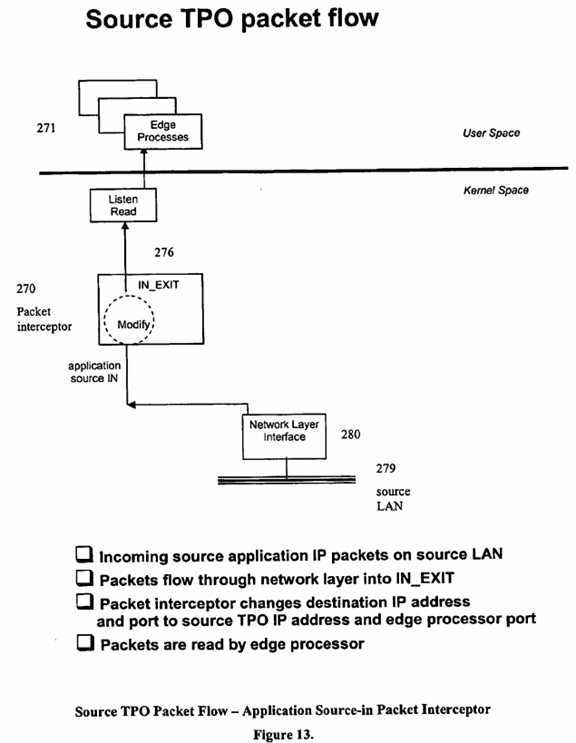
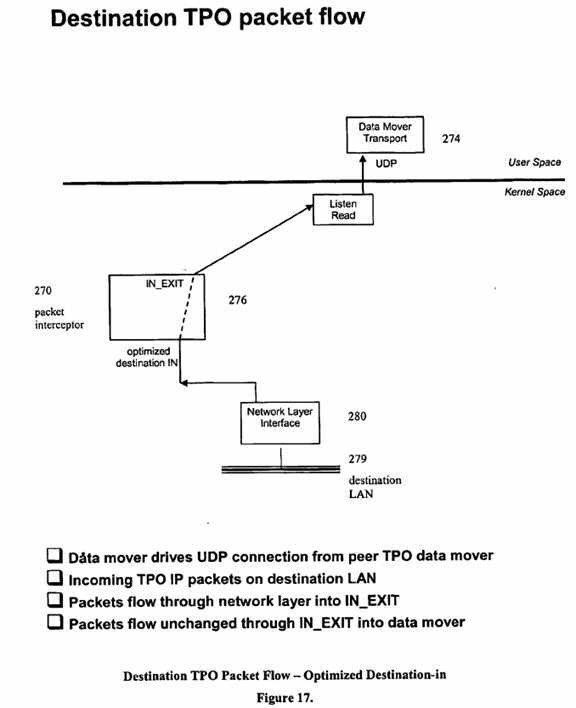
The second exit point is written in Linux as: NF_IP_LOCAL_OUT. This exit point is entered on the source TPO?40?and on the destination TPO?80. In FIG. 20 the interlocking destination TPO interceptor hook?276?is indicated as: OUT_EXIT. In FIG.?16?the interlocking source TPO interceptor hook276?is indicated as: OUT_EXIT. In FIG. 20 the packet interceptor?270, invoked from hook?276, examines the headers of IP packets originating in destination TPO?80?as they leave the IP stack. The packet interceptor looks for quintuples (source IP [port], destination IP [port], protocol) which match those in the packet interceptor memory. For those that match, the source IP address of the IP packet is modified to be that of the source application IP address, and the source port number of the IP packet is modified to be that of the source application port number. Those that do not match remain unmodified, and follow the IP routing rules in effect for the destination IP address contained in the packet. In FIG. 16 the packet interceptor?270, invoked from hook?276, examines the headers of IP packets originating in source TPO?40?as they leave the IP stack. The packet interceptor looks for quintuples (source IP [port], destination IP [port], protocol) which match those in the packet interceptor memory. The packets sent to TPO?80?from TPO?40?will not match the selection criterion, since these packets are TPO packets.
The descriptions of the IN_EXIT and OUT_EXIT processing describe the case when data is generated from TCP/IP application?11?and is sent to TCP/IP application?51. When data is generated by destination application?51, destination application?51?becomes and is referred to as the source application as are each of its connected components which make up the destination LAN, and source application?11?becomes and is referred to as the destination application as are each of its connected components which make up the source LAN.
Edge Processors. The second of the five elements of optimizing TCP/IP applications is edge processing. As packets are intercepted for a given quintuple (source IP [port], destination IP [port], protocol), an edge process?271?(FIG. 1D) is used on each side of the TPO to serve as the local endpoint for each stream of packets. In FIG. 13, source application IP packets flow through packet interceptor?270?(IN_EXIT?276), and if selected, are modified with the IP address of the local TPO and the port number of the edge process?271. In FIG. 14, source application packets are delivered from the edge process?271?to source packet driver?272. In FIG. 19, disaggregated packets are delivered from destination packet driver?272?to destination edge process?271?associated with the quintuple (source IP [port], destination IP [port], protocol) identified in the packet. In FIG. 20, packets flow from the destination edge process?271, to packet interceptor?270?(OUT_EXIT?277). There is an edge processor?271?that serves as the endpoint for each unique quintuple for packets generated by applications using the TCP/IP, TCP/UDP, or TCP/ICMP protocols.
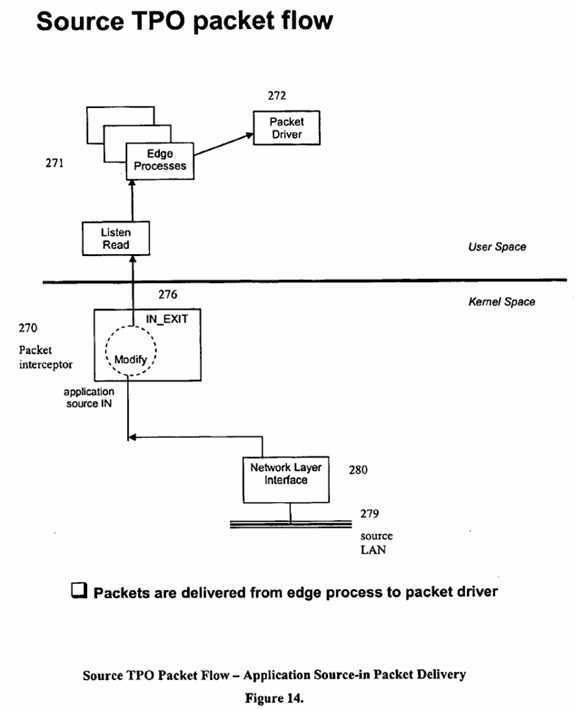
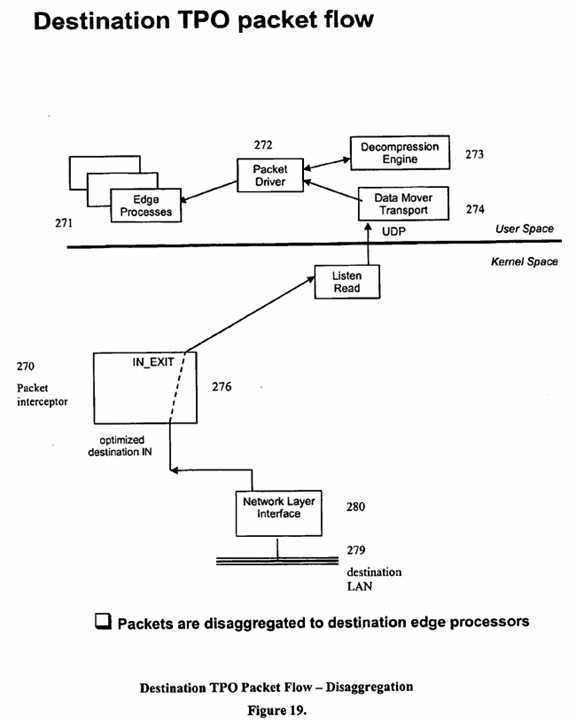
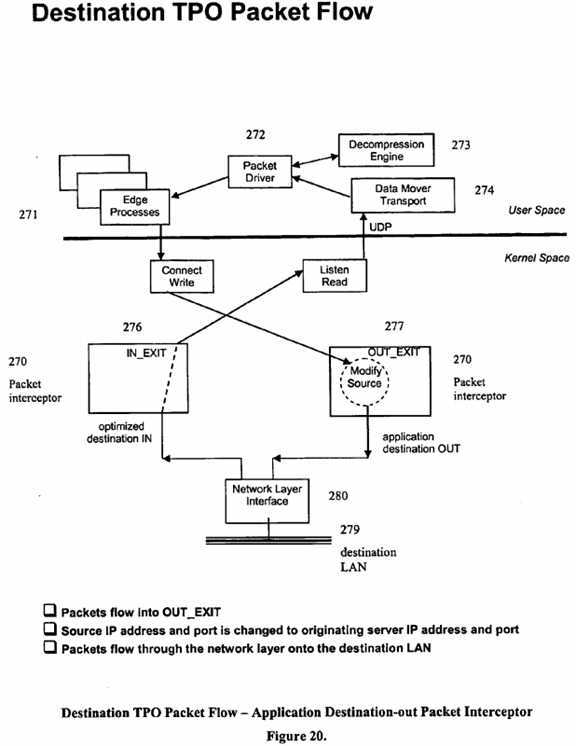
TCP-edge processes are dynamically created whenever a new TCP application connection is detected. Each instance of this component runs as a separate process, and exists for the life of the intercepted TCP connection. Two threads drive this process, one for handling data going to TCP for the intercepted connection and the other for handling data coming from TCP for the intercepted connection. These processes run in the same user space as the other edge processes, as well as the packet driver, compression engine, and the data mover.
The UDP-edge processes are dynamically created whenever a new UDP intercept occurs, based on the UDP selection criteria. The UDP flow differs from TCP applications in that the UDP protocol represents a "connectionless" stream of packets. As with TCP, each instance of this component also runs as a separate process and exists for the life of the intercepted UDP flow. Two threads drive this process, one for handling data going to UDP for the intercepted flow, and the other for handling data coming from UDP for the intercepted flow. These processes run in the same user space as the other edge processes, as well as the packet driver, compression engine, and the data mover.
The ICMP-edge processes are dynamically created the first time an ICMP intercept occurs, based on the ICMP selection criteria. Differing from the other edge processes, there is only one instance of this component, and it also runs as a separate process. Two threads drive this process, one for handling data going to ICMP for the intercepted flow and the other for handling data coming from ICMP for the intercepted flow. These processes run in the same user space as the other edge processes, as well as the packet driver, compression engine, and the data mover.
Packet Driver. The third of the five elements of optimizing TCP/IP applications is the packet driver?272?(FIG. 1D). The packet driver is responsible for establishing and maintaining connections with other TPO appliances on the network. It aggregates the intercepted IP packet data into buffers, compresses the buffers, and passes them to data mover for delivery over a communication link to a peer packet driver for subsequent delivery to the peer user application. The number of intercepted IP packets contained in a buffer, and therefore the size of the packet driver buffer, is variable and is dependent on several factors, including the rate of arrival of incoming source packets, the rate of optimization and delivery of the optimized packets back to the network, and the maximum size of the packet driver buffer, as specified in a TPO configuration file. When viewed from the perspective of the Open System Interconnection (OSI) Reference Model seven layer communication stack, packet driver?272?provides Layer 6 (Application) services. The packet driver runs in the same user space as the edge processes, the compression engine, and the data mover.
In FIG. 15, source packet driver receives intercepted packets from each of the source edge processes?271. It aggregates these data packets into more efficient buffers and passes the aggregated buffers to the compression engine?273. The compressed aggregated buffers are passed to data mover?274?for delivery over the communication link to the destination TPO. In FIG. 18, destination packet driver?272?receives compressed aggregated buffers from data mover. Destination packet driver?272?calls the compression engine?273?to decompress the packets. In FIG. 19, the disaggregated uncompressed packets are passed from packet driver?272?to the appropriate edge process?271, based on the quintuple (source IP [port], destination IP [port], protocol) associated with the packet.
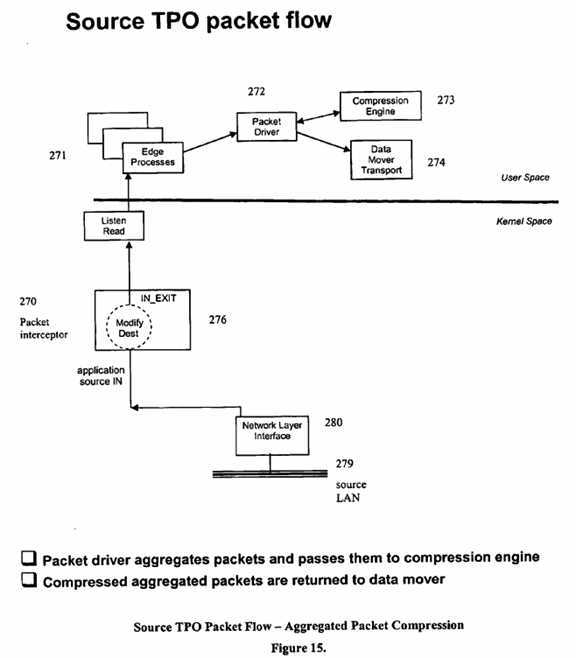
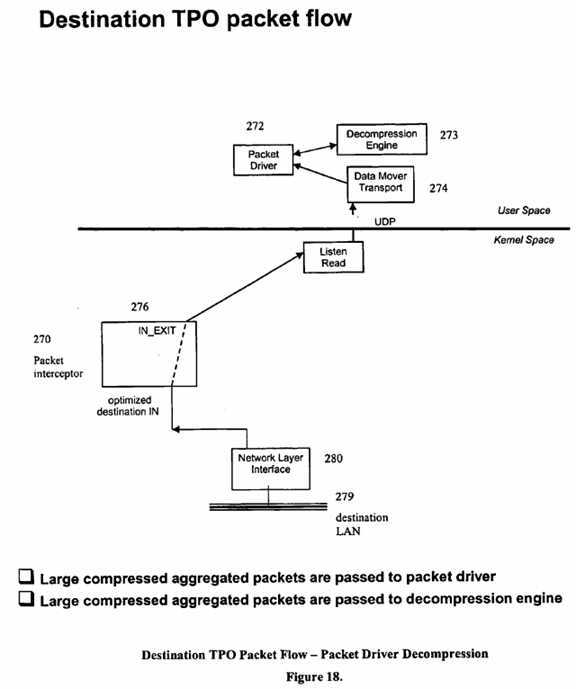
Compression Engine. The fourth of the five elements of optimizing TCP/IP applications is the compression engine?273?(FIG. 1D). The combination of the compression engine and the packet driver compresses data in order to reduce WAN bandwidth usage and effectively increase the data throughput over the network. As previously described, and illustrated in FIG. 15, the intercepted packets are aggregated and stored in a buffer by the packet driver?272. The compression engine?273?then compresses the buffer of aggregated packets prior to delivery to destination packet driver. In FIG. 18, destination packet driver?272?receives the aggregated compressed packets from data mover, and calls the compression engine?273?to decompress the aggregated packets. The combination of aggregation of data packets into buffers with subsequent compression achieves more efficient compression, as large buffers present more opportunities for the compression algorithms to detect repeating patterns of data. The compression engine compresses the data prior to transport over the network by the data mover?274?and decompresses the data after it is received by the destination packet driver, prior to delivery to the destination application.
An adaptive technique enables and disables the compression engine, depending on the level of compression achieved. If it determines that data is incompressible, it will disable the feature and then periodically re-enable it to make another determination whether the data is compressible. If it determines that data is compressible the feature will remain enabled, but the monitoring will continue. The compression engine runs in the same user space as the edge processes, packet driver, and the data mover.
An embodiment of the TPO uses compression engine software. Compression engine software is available from a number of sources. LZS compression algorithm software is available from Hi/Fn Inc., 750 University Avenue, Los Gatos, Calif. 95032. LZO compression algorithm software is available from Markus F.X.J. Oberhumer, Rudolfstr. 24, A-4040 Linz, Austria. LZW compression algorithm software is available from Unisys Corporation, Unisys Way, Blue Bell, Pa. 19424.
Data Mover. The fifth of the five elements of optimizing TCP/IP applications is the data mover?274?(FIG. 1D). It reliably delivers the data to the destination TPO over a network communication link. Since UDP is used as the underlying IP delivery mechanism, data mover?274?handles all flow control, retransmissions, and delivery of data to the end-user application. The data mover runs in the same user space as the edge processes, packet driver, and compression engine.
The data mover protocol described in this specification is an element of an embodiment of a TPO. Other efficient data mover protocols may be available or may be written by one of ordinary skill in the art to substitute for this element. A version of a data mover protocol is available for licensing from Network Executive Software, Inc., located at 6420 Sycamore Lane North, Suite 300, Maple Grove, Minn. 55369. It is marketed under the trademark, "Netex."
The data mover is the transport delivery mechanism between TPO appliances. As illustrated in FIG. 16, data mover?274?receives the optimized/aggregated buffers from the packet driver?272?and delivers them to the destination TPO for subsequent delivery to the destination application. As illustrated in FIG. 17, destination data mover?274?receives the optimized aggregated buffers from the source packet driver. Data mover is responsible for maintaining acknowledgements of data buffers and resending buffers when required. It maintains a flow control mechanism on each connection and optimizes the performance of each connection to match the available bandwidth and network capacity. TPO provides a complete transport mechanism for managing data delivery. And it uses UDP socket calls as an efficient, low overhead, data streaming protocol to read and write from the network.
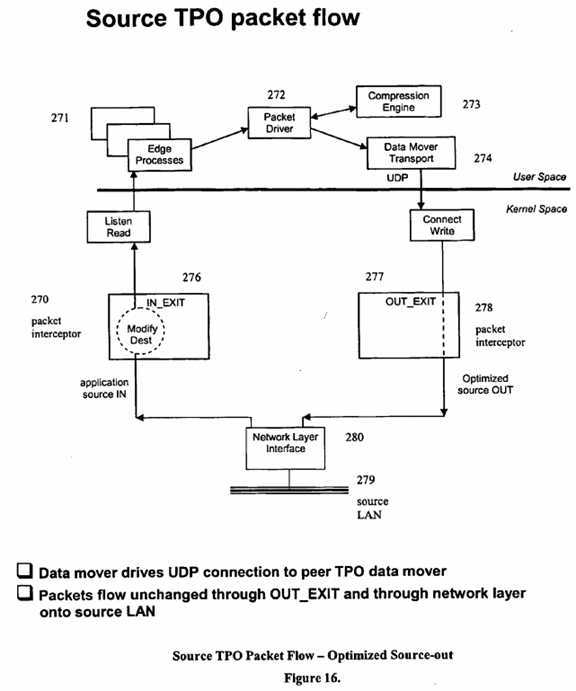
When viewed from the perspective of the Open System Interconnection (OSI) Reference Model seven layer communication stack, data mover?274can be thought of as providing unique Layer 3 (Network), Layer 4 (Transport), and Layer 5 (Session) services. Layer 6 (Application) services are provided by packet driver?272.
The principal function of the Network layer is to establish a path between two TPOs, construct the messages needed to send data between them, and remove routing information before presenting the incoming data to the network caller (i.e., the Transport layer). The Network layer also performs all the multiplexing for the TPOs—the process of sorting out incoming messages by its unique connection identifier and passing the data to the higher level caller. The Network layer interfaces with the IP stack by using UDP socket calls and is responsible for sending and receiving network messages in and out of a Network Interface Card (NIC).
The main responsibility of the Transport layer is to provide reliable, correct data delivery to the remote TPO. It is designed to function in environments with very long propagation delays, extremely high speeds, and/or high error rates. To accomplish this, data mover?274?has: (a) the ability to negotiate transmission block sizes between both sides of the connection; (b) the ability to segment an arbitrarily large block of application data into messages suitable for transmission and to reassemble the data block for the receiving application; (c) an acknowledgement scheme so that messages lost in transit can be retransmitted; (d) a flow control facility so that the receiving TPO is not overrun with data; and (e) an alternate path retry capability where alternate routes to a destination are tried if a primary path fails. The transport layer will deliver data in the correct order at a pace no greater than that desired by the destination. It will either deliver the data successfully or it will report that communications with the destination transport layer have been lost over all possible paths to the destination TPO. In that event, the status of data not explicitly acknowledged by the destination application is not known. The transport layer will deliver data in the correct order at a pace no greater than that desired by the receiver. It will either deliver the data successfully or it will report that communications with the remote transport have been lost over all possible paths to the remote TPO. In that event, the status of data not explicitly acknowledged by the remote TPO is not known.
The Session layer is fairly similar to the services offered by the Transport layer. The major difference is that the Session layer provides the ability to address a remote application by two character string names: a "host" name (i.e., the host name of the remote TPO) and an "application" name (i.e., the application name of the remote packet driver?272).
Rerouting TCP Connections. When a TCP connect is intercepted and it is determined that it should be rerouted (i.e. the "to" and "from" addresses are defined as an intercept), it is queued while the source TPO sends the connect request (which includes the original source and destination IP addresses and ports) to the destination TPO. The destination TPO then issues a TCP connect to the destination IP address and port. The packet interceptor on the destination TPO takes control and changes the source IP address and port from that of the source TPO to the application source IP address and port. The rerouting of the connect is thus transparent to the listening application. A connection success or failure indication is returned to the source TPO. A connect failure is propagated back to the source application. A successful connect causes TPO to reroute all subsequent messages for that connection.
If a TCP connection is not to be rerouted (i.e. the "to" and "from" addresses are not defined as an intercept), then the source TPO merely forwards the connect and all subsequent messages for that connection to the IP layer for standard IP routing.
Messages for rerouted connections are passed up via the standard IP stack to a TPO thread that is created to handle all messages for a particular connection. Each thread reads messages by issuing standard socket interface recv( ) calls and provides the interface between the intercepts and the data mover sessions. The thread becomes the source connection endpoint and is needed to maintain a timely conversation with the source application without the need to wait for transmission and acks from the real destination application.
Received messages are forwarded through the data mover protocol to the destination TPO. The original source and destination IP addresses and ports are sent along with the messages. The destination TPO also creates a thread to handle all messages for a particular connection. This thread is the destination connection endpoint that communicates with the destination application. When messages arrive from data mover, they are sent out by that connection‘s thread by issuing standard socket interface send( ) calls. The packet interceptor modifies the source IP address and port number on each outgoing message to match the original source IP address and port. In this way, the message rerouting is completely transparent to the source and destination applications.
TPO Data Units. FIG. 2 illustrates the content of TPO data units, which are comprised of an IP header field?300, a UDP header field?301, and UDP payload data?101. UDP payload data?101?consists of data mover driver protocol data?302, data mover network protocol data?303, data mover transport protocol data?304, data mover session protocol data?305, packet driver application protocol data?306, and intercepted IP packet data?307. The data associated with each layer is meaningful to the corresponding peer layer in the destination TPO.
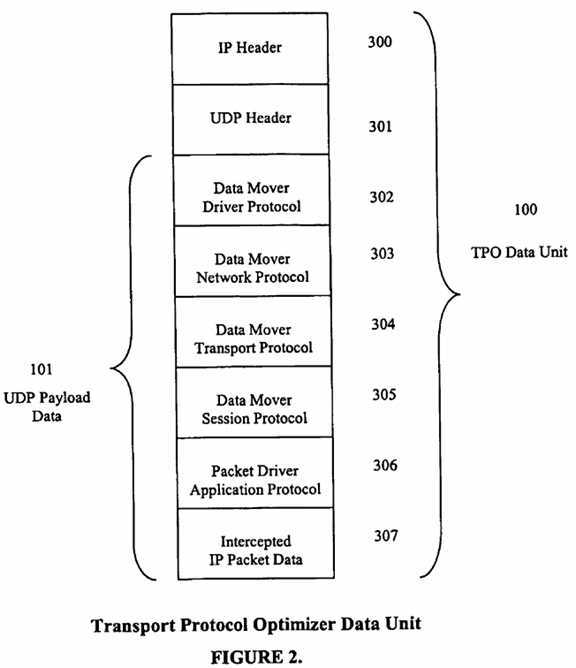
The TPO intercepting IP packets generated from TCP/IP applications creates data units for delivery to a remote TPO and delivers the data units over a UDP connection to a destination TPO. The destination TPO then delivers the intercepted IP packet data to the remote peer TCP/IP application.
An embodiment of the TPO is implemented using IPV4 (Internet Protocol Version 4) networks. Although, a person of ordinary skill in the art of writing data communication software can implement the TPO for IPV6 (Internet Protocol Version 6) networks.
TCP Connection Establishment Packet Flow. FIG. 3A illustrates the flow on the source side of the process for establishing a TCP connection between two peer TCP/IP applications when using a TPO communication link. A TCP/IP connect request?400?is issued by TCP/IP source application?11, running on source application server?10?requesting a connection to destination TCP/IP application?51, running on destination application server?50. The connect request, in block?401, is directed to source TPO?40?by means of standard IP routing mechanisms, which results in source IP packets entering the IP stack of source TPO?40. NF_IP_PRE_ROUTING hook?402?is entered and it is determined if this packet should be selected?403, based on a set of predefined filtering rules for matching source IP address, source IP port, destination IP address, destination IP port, and protocol type. If the packet should not be intercepted, no changes are made to the packet addressing and the packet continues through the stack and follows the routing rules in effect for that IP destination address?404. If the packet should be intercepted, the packet destination IP address is changed to the source network interface of source TPO?40?and the destination port number is changed to the source port number on which source TPO?40?is listening?405. The application connect request is then queued?406. While it is queued, source TPO?40?places the application connect request, along with a message header (FIGS. 9A,9B, and?9C), into a buffer to be sent to destination TPO?80?over the data mover UDP communication path?407. The message header comprises, among other things, the source IP address, source IP port number, destination IP address, destination IP port number, and protocol type (FIG. 9C). In this embodiment, a source edge processor is created?408?to serve as the source connection endpoint for source TCP/IP application?11. When the application connect request is sent to destination TPO?80, the hook, NF_IP_LOCAL_OUT, is entered?409. However, at this hook point nothing needs to be modified in the packet?410, since the IP addressing correctly identifies source TPO?40?and destination TPO?80?as the respective endpoints. The packets leave the stack and go onto source network411. They then wait for a connect response?412?from destination TPO?80.
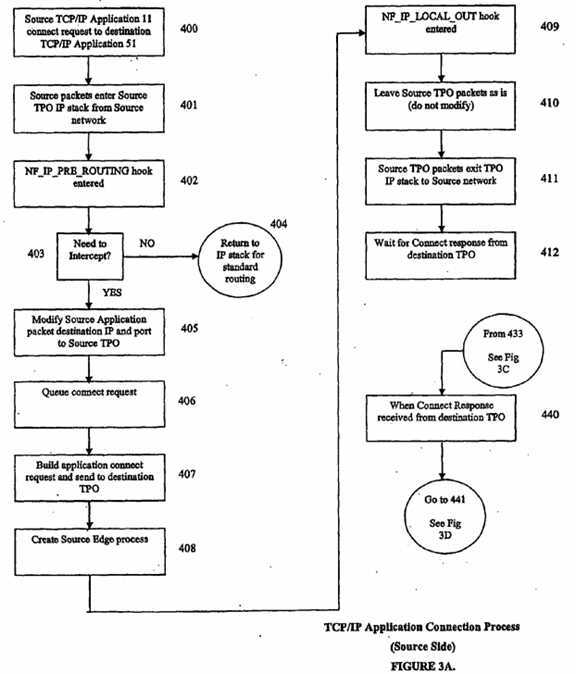
FIG. 3B illustrates the flow from the destination side of the process for establishing a TCP connection between two peer TCP/IP applications when using a TPO communication link. When destination TPO?80?receives source connect request?419, the source IP packets enter the IP stack of the destination TPO from the destination network?420. The NF_IP_PRE_ROUTING hook is entered?421. At this hook point, the addresses in the source IP packet do not need to be modified?422, because the IP addressing correctly identifies TPO?40?as the source and TPO?80?as the destination. The destination edge process?423?is created and a port number is assigned for the endpoint on destination TPO?80. The destination edge process serves as the destination endpoint for the TCP/IP connection between destination TPO?80?and destination application?51. The destination edge process issues the TCP/IP connect request to destination application?51?using the destination IP address and destination port number contained in the source message header?424. The NF_IP_LOCAL_OUT hook is entered?425, which then modifies, at?426, the source IP address to be that of source application server?10?and modifies the source port number to be that of source application?11. The source packet leaves the destination TPO stack and goes onto the destination network?427, at which time this process then waits for the connection response?428?from destination application?51.
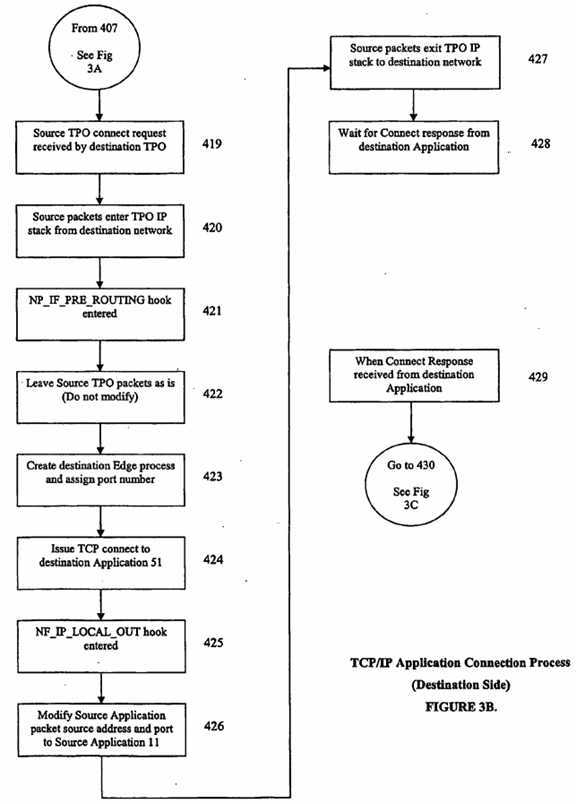
FIG. 3C further illustrates the flow from the destination side of the process for establishing a TCP connection between two peer TCP/IP applications when using a TPO communication link. When the connection response is received 429 from destination application?51?the destination IP packets enter the destination TPO IP stack from the destination network?430. Then the NF_IP_PRE_ROUTING hook is entered?431?and it determines if the destination packet should be intercepted?432, based on a set of predefined filtering rules for matching source IP address, source IP port, destination IP address, destination IP port, and protocol type. If the destination packet should not be intercepted, then no changes are made to the destination packet addressing?433?and the packet continues through the destination IP stack and follows the routing rules in effect for that IP destination address. If the destination packet should be intercepted, the packet IP address is changed?434?to the destination network interface on destination TPO and the destination port number is changed to the destination port on which destination TPO is listening. Since this packet represents the connection response from destination application server?50?that is responding to the intercepted connection request from source application server10, this destination originated packet will be intercepted by destination TPO because its IP address is destination application server?50?and source application server?10. The connection result is returned?435?to source TPO. The NF_IP_LOCAL_OUT hook is then entered?436. At this hook point, nothing needs to be modified in the packet?437, since the IP addressing now correctly identifies destination TPO as the source and source TPO as the destination.
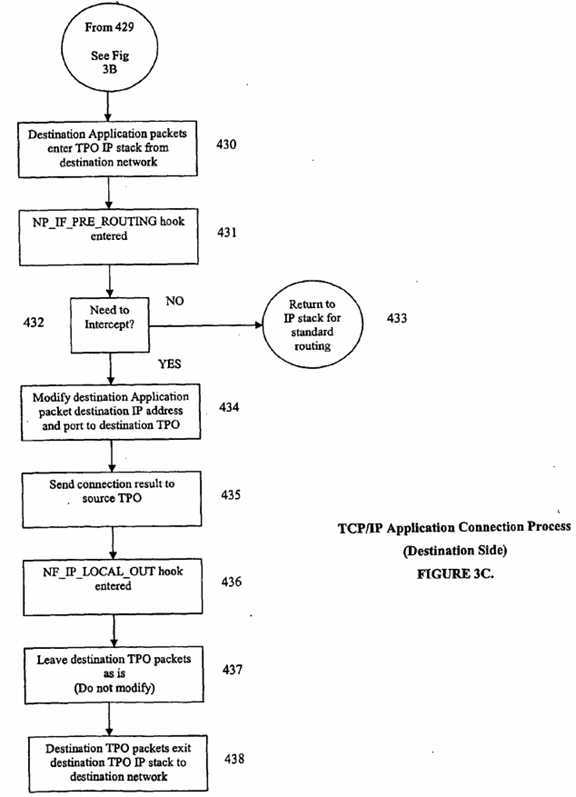
FIG. 3D illustrates the flow from the source side of the process for establishing a TCP connection between two peer TCP/IP applications when using a TPO communication link. When the connect response is received 440 by the source TPO from the destination TPO, the destination IP packets enter the source TPO IP stack from the source network. The NP_IF_PRE_ROUTING hook is again entered?442. At this hook point nothing needs to be modified?443?in the packet because since the IP addressing correctly identifies destination TPO as the source and source TPO as the destination. If the connect request was not successful?444?on the destination TPO, then a predefined invalid port number is set in the queued connect request?445. This will cause the local connection attempt to fail. If the connect request was successful?444?on destination TPO, the predefined port number of source TPO is set in the queued connect request, which will cause the connection attempt to succeed. In either case, the previously queued application connect request is requeued?447?to attempt to establish the connection. Source TCP/IP will then process?448?the local connect request on source TPO. If the valid port number was set in the connect request (meaning the connection was successfully established on the destination TPO), the connection to the source TPO edge process will be accepted. If the invalid port number was set in the connect request (meaning the connection was not established on the destination TPO), the connection to the source TPO edge processor will fail. In either case, there is an IP packet generated that reflects the acceptance or failure of the connection request. The NF_IP_LOCAL_OUT hook is then entered for this packet?449, which then modifies?450?the source IP address to be that of destination application server, and modifies the source port number to be that of source application. The packet leaves the stack?451?and goes onto the source network to the source application, at which time the connection request is complete?452, either successfully or unsuccessfully.
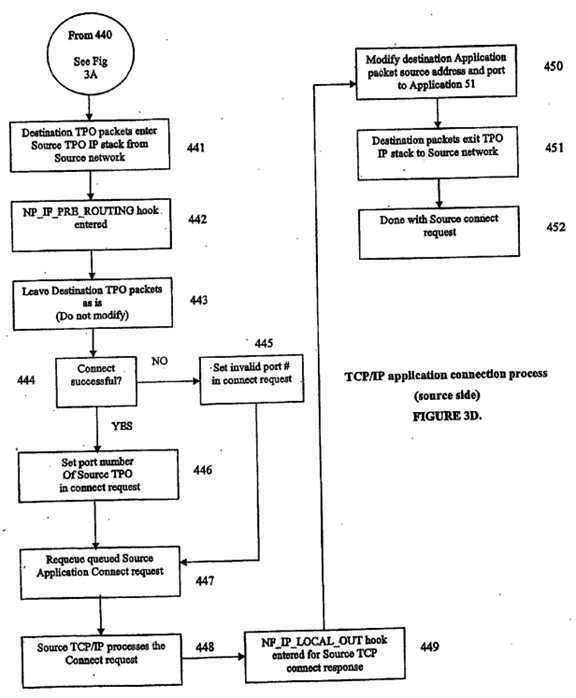
FIGS. 3E and 3F illustrate the process flow that occurs after the establishment of a communication link between two peer TCP/IP applications when sending data over a TPO communication link. A TCP/IP write request?460?is issued by source TCP/IP application?11?running on source application server?10?sending data to destination TCP/IP application?51?running on destination application server?50. The write request is directed to source TPO by means of standard IP routing mechanisms resulting in the IP packets entering the IP stack?461?of TPO?40. NF_IP PRE_ROUTING hook is entered?462?and it is determined whether the packet should be selected?463, based on a set of predefined filtering rules for matching source IP address, source IP port, destination IP address, destination IP port, and protocol type. If the packet should not be intercepted, no changes are made to the packet addressing and the packet continues through the stack and follows the routing rules in effect for that IP destination address?464. If the packet should be intercepted, the packet destination IP address is changed to be that of the source network interface?465?on source TPO and the port number is changed to be the source port on source TPO on which the edge processor for this connection is listening (which was created during the connection sequence). The edge processor reads the intercepted packet?466?and queues the packet and its message header to the packet driver for subsequent insertion into the packet driver buffer?467. When the buffer at?468?is full, or as soon as data mover is able to accept additional requests from the packet driver, the packet driver calls the compression engine (if the compression feature is enabled), then passes the buffer to data mover?469?for the purpose of sending the buffer to the destination TPO over the data mover UDP communication path. The data mover is able to accept additional requests from the packet driver as soon as the previous request from the packet driver is complete, and the resources associated with sending the previous request are available. This means that the size of the buffers passed from the packet driver to the data mover can vary, and do not always contain the same number of message headers. The message header consists of the original source IP address, source IP port, destination IP address, destination IP port, and protocol type. When the UDP buffer is sent to destination TPO, the NF_IP_LOCAL_OUT hook is entered for each IP packet?470. However, at this hook point nothing needs to be modified in the packet, because the IP addressing correctly identifies source TPO and destination TPO as the source and destination endpoints?471. The packets leave the stack and go onto the network?472, at which time source TPO is done processing the write request?473.
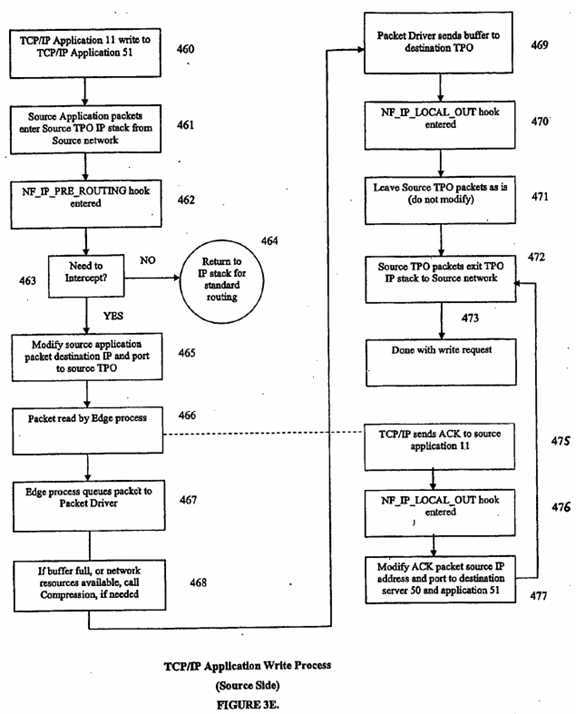
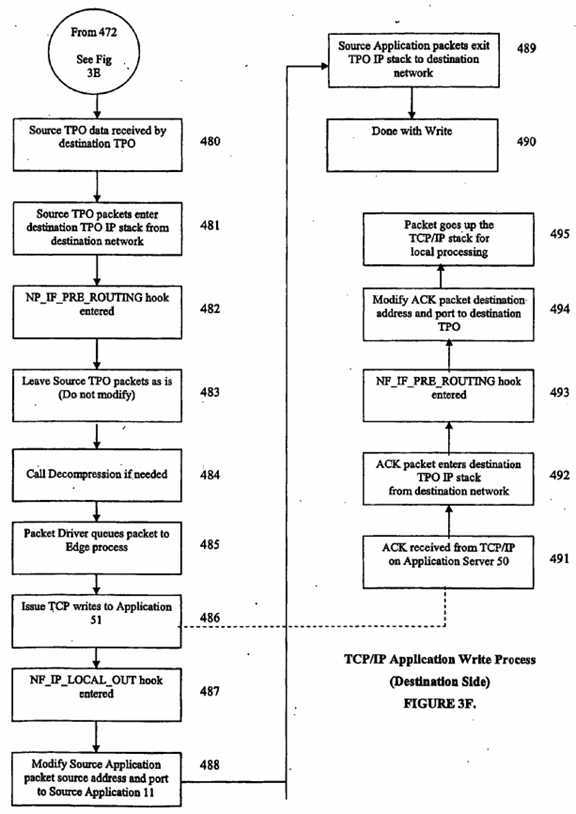
Asynchronous to the edge processor reading the packet?466, the TCP/IP in source TPO will generate an acknowledgement message?475. The NF_IP_LOCAL_OUT hook is entered for this packet?476, which then?477?modifies the source IP address to be destination application server?50?and modifies the source port number to be destination application?51. The?472?packet leaves the stack and goes onto the source network to the source application
When the destination TPO receives the sent buffer?480, the IP packets enter the IP stack from the network?481. Next hook, NF_IP_PRE_ROUTING, is entered?482. At this hook point, the addresses in the IP packet do not need to be modified?483?since the IP addressing correctly identifies source TPO and destination TPO. If the data was compressed, the decompression engine is called to decompress the data?484. The packets are removed from the incoming buffer by the packet driver and queued to the correct edge processor?485?based on the quintuple identified in the message header associated with each packet. The edge processor, serving as the local endpoint of the connection, issues the TCP/IP write request?486?to destination application?51?using the destination IP address and port number contained in the associated message header. Next hook NF_IP_LOCAL_OUT is entered?487?which modifies?488?the source IP address to be source application server?10?and the source port number to be source application?11. The packets leave the stack and go onto the network?489?at which time the destination TPO is done processing the write request?490.
Asynchronous to issuance of the TCP/IP write request?486?to application?51, but after issuance, the TCP/IP in destination application server?50?will generate an acknowledgement message?491?destined for application?11?running on application server?10. When destination TPO?80?receives the ACK, the packet enters the IP stack from the network?492. The NF_IP_PRE_ROUTING hook is entered?493, which then modifies?494?the destination IP address and port number to be that of destination TPO?80. The packet goes up the stack?495?for processing by destination TPO?80.
FIGS. 3G and 3H illustrate the process flow that occurs after the establishment of a communication link between two peer UDP applications when sending data over a TPO communication link. At?500, UDP write request is issued by source UDP application?11?running on source application server?10?sending data to destination UDP application?51?which is running on destination application server?50. The write request is directed to source TPO?40?by means of standard IP routing mechanisms, which results in?501?the IP packets entering the IP stack of source TPO?40. NF_IP_PRE_ROUTING hook is entered and at?503?it is determined if this packet should be selected, based on a set of predefined filtering rules for matching source IP address, source IP port, destination IP address, destination IP port, and protocol type. If the packet should not be intercepted, then?504?no changes are made to the packet addressing and the packet continues through the stack and follows the routing rules in effect for that IP destination address. If the packet should be intercepted, a port number is assigned and the edge processor is created to serve as the local endpoint if this is the first occurrence of a UDP packet for this quintuple?505. Then at?506?the packet destination IP address is changed to be that of the source network interface on source TPO?40?and the port number is changed to be the source port on source TPO?40?on which the edge processor for this quintuple is listening. At?507?the edge processor then reads the intercepted packet and queues the packet, along with a message header, to the packet driver for subsequent insertion into the data mover buffer?508. When the buffer at?509?is full, or as soon as the data mover is able to accept additional requests from the packet driver, the packet driver calls the compression engine (if the compression feature is enabled), then passes the buffer to data mover?510?for the purpose of sending the buffer to the destination TPO over the data mover UDP communication path. The data mover is able to accept additional requests from the packet driver as soon as the previous request from the packet driver is complete, and the resources associated with sending the previous request are available. This means that the size of the buffers passed from the packet driver to the data mover can vary, and do not always contain the same number of message headers. The message header consists of the original source IP address, source IP port, destination IP address, destination IP port, and protocol type. When the UDP buffer is sent to destination TPO?80, the NF_IP_LOCAL_OUT hook is entered at?511?for each IP packet. However, at this hook point, nothing needs to be modified in the packet, since the IP addressing correctly identifies source TPO and destination TPO as the source and destination endpoints?512. At?513?the packets leave the stack and go onto the network, at which time source TPO?40?is done processing the write request?514.
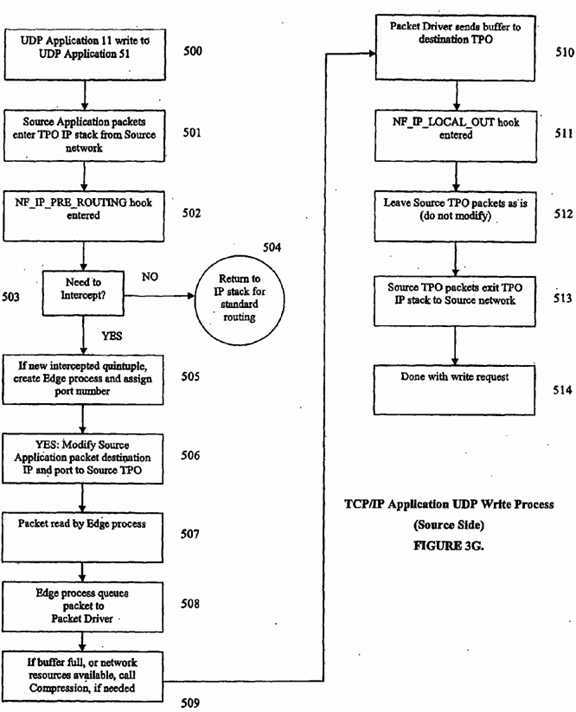
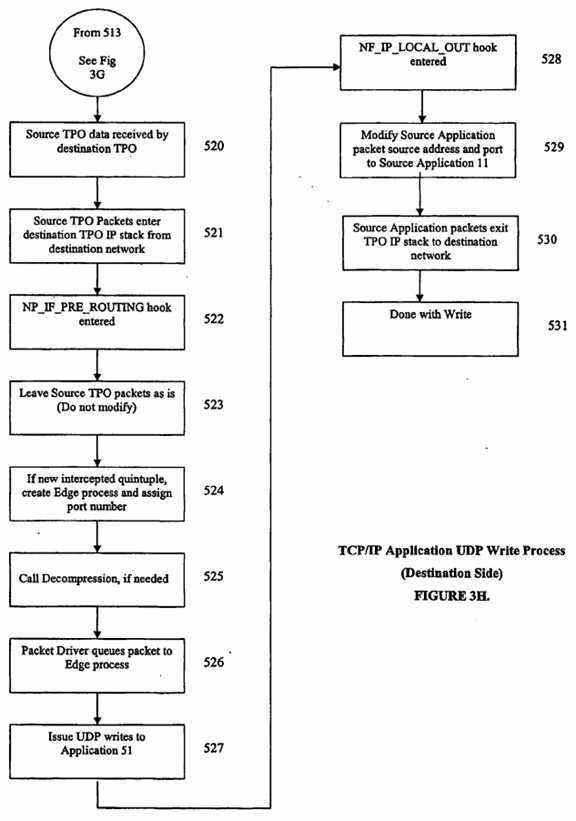
When destination TPO?80?receives?520?the sent buffer, the IP packets enter the IP stack from the network?521. When hook point, NF_IP_PRE_ROUTING, is entered?522, the addresses in the IP packet do not need to be modified?523, since the IP addressing correctly identifies source TPO?40?as the source and destination TPO?80?as the destination. If this is the first occurrence of a UDP packet for this quintuple, a port number is assigned and the edge processor is created to serve as the local endpoint for this quintuple. If the data was compressed, the decompression engine is called to decompress the data?525. The packets are removed from the incoming buffer by the packet driver and passed to the assigned edge processor based on the quintuple identified in the message header associated with each packet?526.
The edge processor, at?527, serving as the local endpoint of the connection issues the UDP write request to application?51, using the destination IP address and port number contained in the associated message header. At?528, the NF_IP_LOCAL_OUT hook is entered, which then modifies?529the source IP address to be that of source application server?10, and modifies the source port number to be that of source application?11. At?530, the packets leave the stack and go onto the network at which time destination TPO?80?is done processing the write request?531.
FIGS. 3I and 3J illustrate the process flow that occurs after the establishment of a communication link between two peer ICMP applications when sending data over a TPO communication link. The edge processors are created and port numbers assigned during TPO initialization to handle all ICMP requests. These edge processors serve as the local endpoints for ICMP requests issued by source application?11?running on source application server?10?and by destination application?51?running on destination application server?50. At?540, a ICMP write request is issued by ICMP source application?11?running on source application server?10, sending data to ICMP destination application?51?running on destination application server?50. The write request is directed to source TPO?40?by means of standard IP routing mechanisms, which results, at?541, in the IP packets entering the IP stack of source TPO?40. At?542, the NF_IP_PRE_ROUTING hook is entered and, at?543, a determination is made whether this packet should be selected, based on a set of predefined filtering rules for matching source IP address, source IP port, destination IP address, destination IP port, and protocol type. If the packet should not be intercepted, then, at?544, no changes are made to the packet addressing and the packet continues through the stack and follows the routing rules in effect for that IP destination address. If the packet should be intercepted, then at545, the packet destination IP address is changed to be that of the local network interface on source TPO?40, and the port number is changed to be the local port on source TPO?40?on which the ICMP edge processor is listening. At?546, the edge processor then reads the intercepted packet and at?547?queues the packet, along with a message header to the packet driver for subsequent insertion into the data mover buffer. When the buffer at548?is full, or as soon as the data mover is able to accept additional requests from the packet driver, the packet driver calls the compression engine (if the compression feature is enabled), then passes the buffer to the data mover?549?for the purpose of sending the buffer to the destination TPO over the data mover UDP communication path. The data mover is able to accept additional requests from the packet driver as soon as the previous request from the packet driver is complete, and the resources associated with sending the previous request are available. This means that the size of the buffers passed from the packet driver to the data mover can vary, and do not always contain the same number of message headers. The message header consists of the original source IP address, source IP port, destination IP address, destination IP port, and protocol type. When the UDP buffer is sent to destination TPO?80?the, the NF_IP_LOCAL_OUT hook is entered for each IP packet. However, at this hook point,?551, nothing needs to be modified in the packet since the IP addressing correctly identifies source TPO?40?and destination TPO?80?as the source and destination endpoints. At?552, the packets leave the stack and go onto the network at which time,?553, source TPO?40?is done processing the write request.
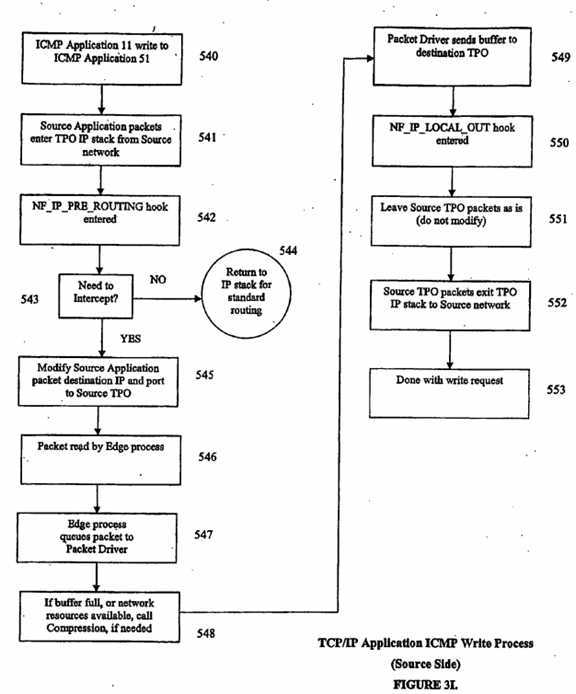
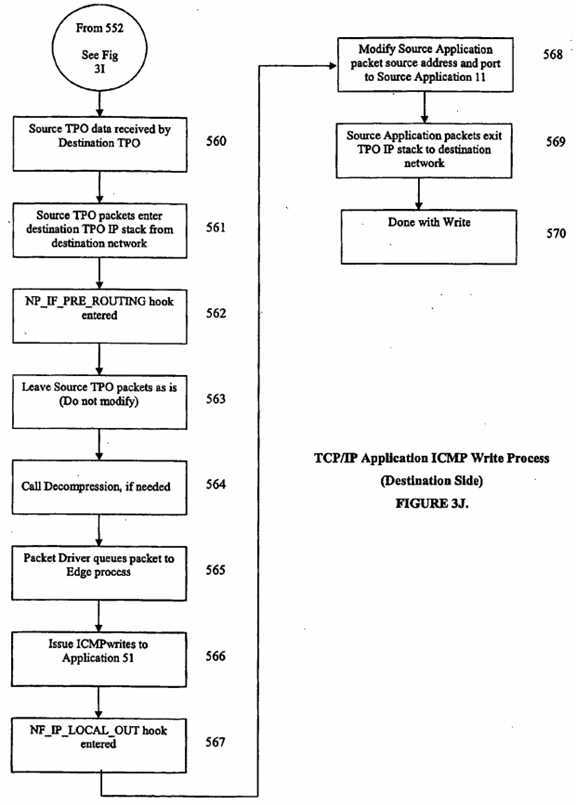
As shown in FIG. 3J at?560, when destination TPO?80?receives the sent buffer, the IP packets enter, at?561, the IP stack from the network. At?562, the NF_IP_PRE_ROUTING hook is entered. At this hook point, the addresses in the IP packet do not need to be modified?563?because the IP addressing correctly identifies source TPO?40?as the source and destination TPO?80?as the destination. If the data was compressed, the decompression engine is called to decompress the data?564. At?565, the packets are removed from the incoming buffer by the packet driver and passed to the ICMP edge processor. At?566, the edge processor, serving as the local endpoint of the connection, issues the ICMP write request to destination application?51?using the destination IP address and port number contained in the associated message header. At?567, the NF_IP_LOCAL_OUT hook is entered, which then modifies at?568?the source IP address to be that of source application server?10?and modifies the source port number to be that of source application?11. At?569, the packets leave the stack and go onto the network at which time the destination TPO?80?is done processing the write request,?570.
The data mover is comprised of Layer 3 (Network), Layer 4 (Transport), and Layer 5 (Session) services. Application Layer services (Layer 6) are provided by the packet driver. Each of the data mover layers provides a set of interface services: the Network layer uses the Driver services, which consist of UDP socket calls; the Transport layer uses the Network services; the Session layer uses the Transport services.
Application Layer services are provided by the packet driver, which interfaces with the data mover at the Session Layer. The packet driver is responsible for aggregating the data from intercepted packets along with the packet routing information into a TPO buffer. When either the buffer is full or TPO Session Services are available the local packet driver uses the S-WRITE Session Service to send this buffer over the TPO connection to the peer packet driver on the other side of the connection. This data will complete an S-READ Session Service request previously issued by the peer packet driver.
Each TPO buffer can contain intercepted IP packet data from more than one application server and can contain intercepted IP packet data that is destined to more than one application server. In other words, all of the data for the intercepted IP packets in a given TPO buffer may have different source IP addresses and/or different destination IP addresses. It is up to the receiving TPO packet driver to process the routing information received with each packet and deliver the IP packets to the correct destination.
Communication between the packet driver and the data mover takes place by sharing a data structure, referred to as the data mover network request block (NRB). This structure contains fields that are examined and updated during the course of a connection. Data mover calls consist of service requests to establish a connection, transfer data, and terminate a connection. The types of service calls available are connect, offer, confirm, write, read, close, and disconnect.
Connect is used to establish a connection to the remote packet driver through a matching Offer. It allocates the resources needed to maintain a connection at the session level and all lower levels. Data associated with each level will be delivered to the matching layer on the other end along with the Connect indication.
Offer is used when a packet driver wishes to be connected to a peer packet driver. It allocates the connection resources needed to receive connection data from the network. Successful completion of the Offer provides a Connect indication as well as the data sent by the Connect.
Confirm is issued upon completion of an Offer by the packet driver that accepted the connection. It may provide data that will be sent back to the connecting packet driver. Upon receipt of the Confirm by the connecting side, the connection is considered complete.
Write is the normal means of sending data to the other side. A Write request completes as soon as the local data mover has accepted responsibility for the data.
Read is a signal to the data mover that the packet driver is prepared to accept further data or indications from the data mover. The Read mechanism is used by the data mover to allow the packet driver to accept data from the network at a sustainable rate.
Close is used to gracefully terminate the connection. When one packet driver issues a Close no further transmissions may take place from that packet driver. When the second side issues a Close the connection is terminated.
Disconnect is used to abruptly terminate a connection. The other side receives a Disconnect indication and any data in progress will be lost.
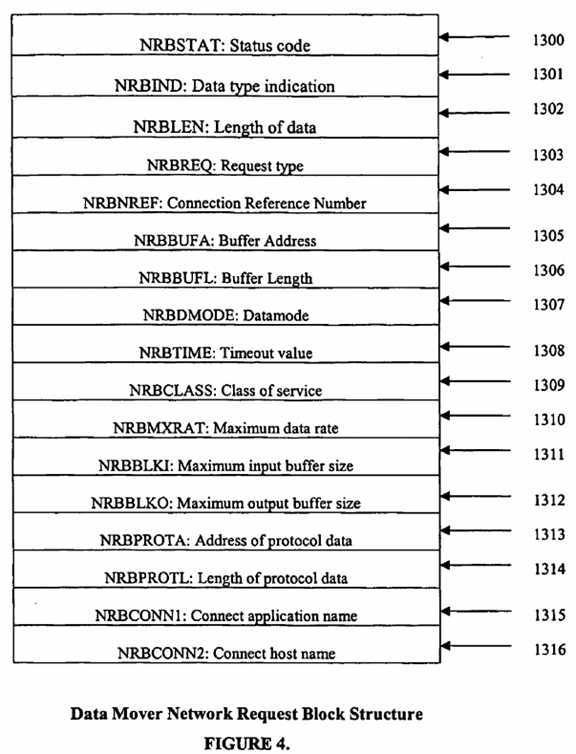
The data mover network request block (NRB) provides the interface structure between the packet driver component and the data mover. FIG. 4 illustrates the content of the data mover network request block. The contents of the data mover network request block and an explanation of the contents are as follows:
The packet driver interfaces with the data mover at the Session Layer. Besides providing access to Transport Services, the Session Layer also provides the ability to address a remote packet driver application by two character string names: the "host" name of the TPO unit and an "application" name of the packet driver. A packet driver issues an S-OFFER request, which "advertises" the application name ("SESSION1") as being available on that "host". A packet driver component on another TPO unit that wishes to connect to this packet driver issues an S-CONNECT request, providing the "host" and "application" names. Data may be provided by the S-CONNECT, which will fill the buffers supplied by the S-OFFER request. After the Connect data has arrived, the receiving packet driver issues an S-CONFIRM which satisfies the connector‘s S-READ. Both sides may concurrently S-READ and S-WRITE data. The connection may be terminated with a pair of S-CLOSE requests or a single S-DISCONNECT request. Session service provides a simple means of identifying and connecting packet driver on two TPO units. To accomplish this, Session service actually performs two Transport connections during the lifetime of a single Session connection; one connection to a data mover component called Session Manager; and a second connection to perform data transfer between the two packet drivers. The purpose of the Session Manager element is to provide a unique reference number (N-ref) for each offering packet driver connection, and returning it to the packet driver from which a connection request is received. This reference number is used on all subsequent messages destined for this connection.
FIG. 8F illustrates the establishment of a communication link between packet driver components on two TPOs. The TPOs establish a packet driver connection during the TPO initialization process that remains as a persistent connection.
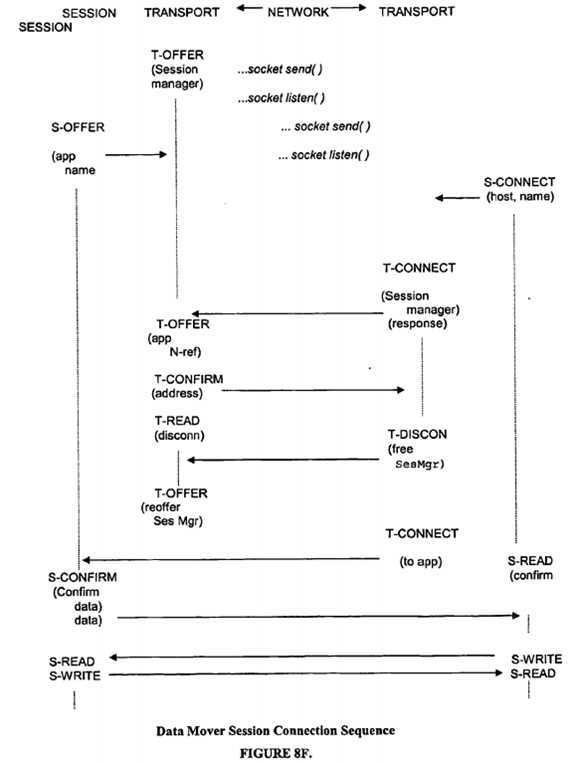
During TPO initialization, the Session Manager issues a T-OFFER, using a well-known network reference number. When the packet driver issues the S-OFFER request, the Session Manager receives control. It places the eight character application name (SESSION1) in an internally maintained list of applications that have "advertised" for service.
Connection establishment begins when the Session Manager‘s T-OFFER completes with a Connect Indication, received from a remote packet driver. The Odata associated with the Connect Indication contains information supplied by the initiation of an S-CONNECT request from a packet driver on a peer TPO. This Odata contains the application name of the process to be connected to (SESSION1), along with the application and host name of the connecting packet driver component.
The session manager responds to the connecting packet driver by issuing a T-CONFIRM with the results of the Session "match." If the application named ("SESSION1") by the connector is unknown to the Session Manager, then failure will be reported in the T-CONFIRM Odata. If the application is known, then the entry is removed from the session manager‘s list of offered application names. N-ref‘s are assigned for the local offering packet driver. A T-OFFER is issued on the behalf of the local offering packet driver by the Session manager. The N-ref‘s that should be used for the connection are supplied to the connecting packet driver by the T-CONFIRM request issued by the session manager.
When the remote packet driver that is processing the S-CONNECT request has the Confirm Indication returned from the Session Manager, it issues a T-DISCONNECT to free the Session Manager. The connector then issues a T-CONNECT to the N-ref specified in the Confirm data. Finally, the "direct" connection proceeds between the two packet driver components.
Once the connection is established to the remote packet driver, then Session service "drops out" in the sense that subsequent Session service calls from the packet driver simply invoke the equivalent Transport service call.
The present invention therefore contains a method of forming TPO messages that include Session Protocol data for the purpose of communicating with the peer-level Session layer on the remote side of the TPO network.
The S-CONNECT request is used to establish a Session Connection. It initiates the establishment of a connection to a remote packet driver component that has issued an S-OFFER request. When invoked, Session service will establish a Transport connection to the remote TPO and send it messages to establish the connection. It will send information that will allow data to flow in an orderly, full duplex manner between applications.
Data mover connection philosophy works with an "active" and a "passive" party for any connection. The "passive" party issues an S-OFFER request and waits for a subsequent connection to arrive. Any other TPO with network access may then connect to it. The "active" party then issues an S-CONNECT which causes the connection to be opened. If an S-CONNECT is issued to connect to a packet driver that is not yet present, then the connection will fail. Thus the S-OFFER must precede the S-CONNECT chronologically.
When the S-CONNECT is issued, the packet driver specifies two buffer lengths and addresses—one for Pdata and one for Odata. The Odata is always sent and received in "octet" (8 bit byte) format. The amount of Odata that may be sent over any connection is dependent on installation parameters specified for both the local and remote copies of the data mover.
The parameters used in the data mover Network Request Block for the S-CONNECT request are as follows:
The results of an S-CONNECT completion are as follows: (a) NRBSTAT/success/failure code; (b) NRBIND/set to zero; (c) NRBNREF/S-ref (Session ID) assigned; (d) NRBBLKO/maximum transmission Pdata size; (e) NRBBLKI/maximum reception Pdata size; and (f) NRBMXRAT/max transmission speed of path.
The S-OFFER request is used to solicit an incoming Session Connection. It is used by a packet driver that wants to establish a "passive" connection, that is, to wait for another. Or it is used by an "active" packet driver to request that the connection be completed. It is a read-type request in the sense that it remains outstanding until an incoming S-connect indication arrives, and that data sent by the remote S-CONNECT will be used to fill buffers specified by the S-OFFER.
The parameters used in the data mover Network Request Block for the S-OFFER request are as follows:
The results of the completion of the S-OFFER are as follows: (a) NRBSTAT/success/failure code; (b) NRBIND/contains Connect Indication; (c) NRBLEN/length of incoming Pdata; (d) NRBPROTL/length of Odata received; (e) NRBNREF/S-ref assigned this connection; (f) NRBBLKO/maximum transmission Pdata size; (g) NRBBLKI/maximum reception Pdata size; (h) NRBMXRAT/max transmission speed of path; (i) NRBCONN1/name of host where S-conn originated; and (j) NRBCONN2/user-id of program originating S-conn.
S-CONFIRM indicates completion of a Session connection. It is issued by the offering packet driver in response to a successfully completed S-OFFER. It signals the intent of the offering packet driver to go ahead with the connection, and to have data sent back to the originating packet driver. Either S-CONFIRM or S-DISCONNECT must be issued in response to a successful S-OFFER; any other request will be rejected. An S-CONFIRM is not valid at any time other than immediately after the S-OFFER. S-CONFIRM is a write type command and both Odata and Pdata may be sent back to the connecting Packet Driver.
The parameters used in the data mover Network Request Block for the S-CONFIRM request are as follows:
The results of the S-CONFIRM completion are: (a) NRBSTAT/success/failure code; and (b) NRBIND/set to zero.
The S-READ solicits an indication for additional data or a connection status Indication. It is a request that informs the data mover that the packet driver is ready to process additional input from a Session connection. In general, such input will be a data indication of some type, indicating that data has arrived from the remote packet driver. However, it can also be a disconnect Indication indicating that the connection has been lost for some reason. One of the purposes of the S-READ is to allow the packet driver to accept incoming data at a constrained rate. However, it is essential that an S-READ be issued to service incoming data on a timely basis. The data mover Transport service places a time interval limit (referred to as READTO) which causes a connection to be terminated if no S-READ is issued to receive an incoming indication within READTO seconds of elapsed time. In addition to Odata and Pdata, the S-READ request will complete with an "indication" in NRBIND, which indicates the type of Session request that was issued to send this data. A Confimm, Data, Close, or Disconnect indication may be received along with its associated Odata and Pdata.
The parameters used in the data mover Network Request Block for the S-READ request are as follows:
The results of the completion of the S-READ are as follows: (a) NRBSTAT/success/failure code; (b) NRBIND/contains Connect Indication; (c) NRBLEN/length of incoming Pdata; and (d) NRBPROTL/length of Odata received.
The S-WRITE request is used to send data to a remote packet driver. It is used when a connection is fully established to send Odata and Pdata to the remote packet driver. When issued, the S-WRITE completes as soon as session has accepted responsibility for the data. The data will be delivered correctly and in order so long as the connection remains intact.
The parameters used in the data mover Network Request Block for the S-WRITE request are as follows:
The results of the completion of an S-WRITE are as follows: (a) NRBSTAT/success/failure code; and (b) NRBIND/set to zero.
S-CLOSE gracefully terminates a Session Connection. When either side of a connection determines that it has only one block or no more data to send, it may issue an S-CLOSE request. The S-CLOSE is a write type request and may have data associated with it, following the same rules as WRITE requests. After the CLOSE is issued, the issuer may not issue any more WRITE type requests except DISCONNECT. The issuer may continue to read data indefinitely. All pending written data is provided to the remote packet driver, in order of transmission. The last data item received will have a Close Indication associated with it. No further reads will be accepted for this connection. The remote packet driver may issue any number of WRITEs to the originating packet driver. When the remote packet driver has no more data to send, it issues a CLOSE (with optional data). At that time, the connection is terminated from the vantage point of the remote packet driver. The originating application will receive all data written by the remote packet driver in proper order. The last data received will contain a Close Indication. When the Close Indication is read, the connection is terminated from the viewpoint of the originating packet driver.
The parameters used in the Data Mover Network Request Block for the S-CLOSE request are as follows:
The results of the completion of the S-CLOSE are as follows: (a) NRBSTAT/success/failure code; and (b) NRBIND/set to zero.
The S-DISCONNECT request aborts a Session Connection. When either side of the packet driver connection determines that the connection must be abruptly terminated, it may issue the S-DISCONNECT request. S-DISCONNECT is a preemptive service in that all reads, writes, and data buffers "in progress" are discarded. If the packet driver issues an S-DISCONNECT, then the S-READ request (if any) that is outstanding will terminate with an error in NRBSTAT. Any further attempts to issue requests against the connection will be rejected. The remote packet driver will continue to receive any data in progress until the remote packet driver‘s Session service detects the incoming Disconnect Indication. Any connection indications waiting to be delivered to the packet driver will be discarded. The next S-READ will complete with a Disconnect Indication, a normal status in NRBSTAT, and the Odata and Pdata supplied by the originator of the S-DISCONNECT. Disconnect service is different from other requests in that delivery of the Disconnect Odata and Pdata is not guaranteed. Such data may be lost in such a way that the local Session service cannot be sure if it was delivered or not. The S-DISCONNECT is valid at any time in the lifetime of the connection that a Write-type request (Confirm, Write, Close) may be issued. It is also valid following an S-CLOSE request. In that case data may not be sent to the remote packet driver but the connection will be terminated.
The parameters used in the Data Mover Network Request Block for the S-DISCONNECT request are as follows:
The results of the completion of the S-DISCONNECT are: (a) NRBSTAT/success/failure code; and (b) NRBIND/set to zero.
Transport Layer Services.
The Transport Protocol contained in the data mover is used by the packet driver connections. The packet driver components interface with the data mover at the Session Layer. However, all Session Layer services internally make use of the services provided at the Transport Layer. Transport service is distinct from the Session Layer in that connections can only be made to other applications whose exact physical address on the network is known, and the application connected to must be present and soliciting input at the time. Transport service uses the lower Network service to establish connections on the network and to frame data for delivery on the network.
The data mover protocol is designed to function in environments where very long propagation delays, extremely high speeds, and high error rates are all concurrently encountered. Most conventional protocols do not function well in such an environment. In order to resolve the long delay and high error rate problem, the data mover Transport uses a "continuous" type of protocol—one in which only blocks received in error are retransmitted, rather than "backing up" to the point where the erroneous block was sent and sending all subsequent blocks. The data mover Transport uses a dual numbering scheme for blocks. There is a "physical block number" which is incremented by one each time Transport issues an N-CONNECT or N-WRITE request. In addition, there is a "logical block number" which is incremented by one each time the Transport application issues a write type Transport service request.
The primary functions to be performed by Transport are those of retransmission, flow control, and message segmenting. The data mover works under a wide variety of network configurations, but it is particularly well suited to operate effectively in high bandwidth networks over long distances; and over clean networks as well as over networks experiencing moderate to high rates of packet loss. To accomplish this, the data mover dynamically calculates round-trip times, bandwidth capacity, and rate control and in general is more adaptive to dynamic network conditions. Assuming there are adequate resources available on both the sending and receiving side, this protocol allows the data mover to be extremely efficient in bandwidth utilization. It is designed to operate in either a "closed network" environment, where maximizing usage of bandwidth is not an issue, or in an "open network" environment, where the protocol needs to be aware of co-usage of the network. The dynamic adaptive rate control mechanisms implemented in this protocol allows it to operate in this environment, and to co-exist with other applications.
A T-OFFER request allocates the resources so that an explicit path to the transport application (packet driver) through the lower network layers is established. At that time, the T-OFFER waits for a matching T-CONNECT request. T-CONNECT accepts an (optional) buffer of data to be sent to the OFFERing receiver, and a list of routes (addresses) that specify the network path or paths that may be used to contact the receiver. When the CONNECT data arrives at the receiver, it completes the OFFER and presents the connect data to the receiving packet driver. The receiving packet driver responds with a T-CONFIRM request which indicates the intent to complete the connection. If the connection is not desired, the receiver may issue T-DISCONNECT instead. T-CONFIRM may have data sent along with it. The connecting packet driver will receive the data with a T-READ request that completes with a Confirm Indication. After the connection is established, data transfer proceeds in a full duplex manner, with flow control, segmenting, and retransmission taking place concurrently in both directions. So long as the connection remains in effect, a T-WRITE request by one of the packet drivers will place the data in a transmission queue so that it will eventually satisfy a T-READ issued by the peer packet driver. When the connection is complete, either side may begin connection termination by and sending all subsequent blocks. The data mover Transport uses a dual numbering scheme for blocks. There is a "physical block number" which is incremented by one each time Transport issues an N-CONNECT or N-WRITE request. In addition, there is a "logical block number" which is incremented by one each time the Transport application issues a write type Transport service request.
The primary functions to be performed by Transport are those of retransmission, flow control, and message segmenting. The data mover works under a wide variety of network configurations, but it is particularly well suited to operate effectively in high bandwidth networks over long distances; and over clean networks as well as over networks experiencing moderate to high rates of packet loss. To accomplish this, the data mover dynamically calculates round-trip times, bandwidth capacity, and rate control and in general is more adaptive to dynamic network conditions. Assuming there are adequate resources available on both the sending and receiving side, this protocol allows the data mover to be extremely efficient in bandwidth utilization. It is designed to operate in either a "closed network" environment, where maximizing usage of bandwidth is not an issue, or in an "open network" environment, where the protocol needs to be aware of co-usage of the network. The dynamic adaptive rate control mechanisms implemented in this protocol allows it to operate in this environment, and to co-exist with other applications.
A T-OFFER request allocates the resources so that an explicit path to the transport application (packet driver) through the lower network layers is established. At that time, the T-OFFER waits for a matching T-CONNECT request. T-CONNECT accepts an (optional) buffer of data to be sent to the OFFERing receiver, and a list of routes (addresses) that specify the network path or paths that may be used to contact the receiver. When the CONNECT data arrives at the receiver, it completes the OFFER and presents the connect data to the receiving packet driver. The receiving packet driver responds with a T-CONFIRM request which indicates the intent to complete the connection. If the connection is not desired, the receiver may issue T-DISCONNECT instead. T-CONFIRM may have data sent along with it. The connecting packet driver will receive the data with a T-READ request that completes with a Confirm Indication. After the connection is established, data transfer proceeds in a full duplex manner, with flow control, segmenting, and retransmission taking place concurrently in both directions. So long as the connection remains in effect, a T-WRITE request by one of the packet drivers will place the data in a transmission queue so that it will eventually satisfy a T-READ issued by the peer packet driver. When the connection is complete, either side may begin connection termination by issuing a T-CLOSE request. T-CLOSE may have data associated with it. Following the first T-CLOSE, the issuing packet driver may not write any more data on that connection (except a T-DISCONNECT). The other side will receive the Close data with a Close Indication following the normal reception of all normally written data. It may write as much data to the originating connection as it chooses, but it will not be able to receive any more data from the originator. Connection termination completes when the second packet driver issues its own T-CLOSE request. The connection is terminated when the originating party receives the T-CLOSE request following the reception of all normal data preceding the CLOSE.
Transport also offers a T-DISCONNECT service for use in abruptly terminating a connection at any time. Either party may issue a T-DISCONNECT request. Data may be included with the T-DISCONNECT, but delivery of the data is not guaranteed. Disconnect is preemptive in that it will be presented to the receiver as soon as it arrives at the receiving side. Data controlled by transport, regardless of the direction in which it is sent, will be lost.
The foregoing embodiments of the TPO describe a method of forming data mover messages that include Transport Protocol data for the purpose of communicating with the peer-level Transport layer on the remote side of the TPO network.
Transport Dynamic Adjustments. In order to dynamically make adjustments to the data mover protocol to meet the conditions of the network, periodic adjustments are made to rate control, latency time, and bandwidth capacity. Rate control is established by the sending side of the data mover matching the speed at which the remote packet driver, running on the remote TPO, is receiving the data. The rate at which the remote server application is receiving the data is returned in the TMSGRSPD value in the Transport Protocol Acknowledgement Subfield (820?in FIG. 7D). The latency time represents the additional time incurred for the act of transmitting data over a network. Longer network distances result in higher latency times. The latency times are determined by the sending side of the data mover, by calculating the round trip times for the transmission and acknowledgement of messages. The bandwidth capacity represents the total amount of data that can be on the network at any point in time. The data mover makes adjustments to its bandwidth capacity value by periodically calculating a new value as the values for "rate" and "latency time" change. The formula used for this calculation is: Capacity bandwidth (bits/sec)×round-trip time (sec).
Transport Timers and Timeouts. Three time intervals are used by Transport Services to continuously monitor the state of the connection. They are:
If either end of a Transport connection has its DEADTIME reach DEADTO (dead timeout), then it will conclude that communications are lost. Alternate Path Retry will then take place or the connection will be terminated.
Transport Connection Sequences. FIG. 8G illustrates the data mover transport connection sequence. The Transport Connection process basically takes place in the T-OFFER-T-CONNECT-T-CONFIRM sequence. The "ack credit" field sent with the Connect protocol data will dictate if an Idle message will be sent by the offering side in response to receipt of a Connect Indication. If the Ack Credit is 0 or 1, an Idle message will be immediately returned. If it is 2 or higher, then it can be returned with the Confirm Information unless the offering packet driver takes more than IDLETO seconds to generate a T-CONFIRM response. The connection is "half duplex" until the T-CONFIRM is sent or the Confirm Indication is read. After that time, T-WRITEs may overlap in any way on a full duplex connection.
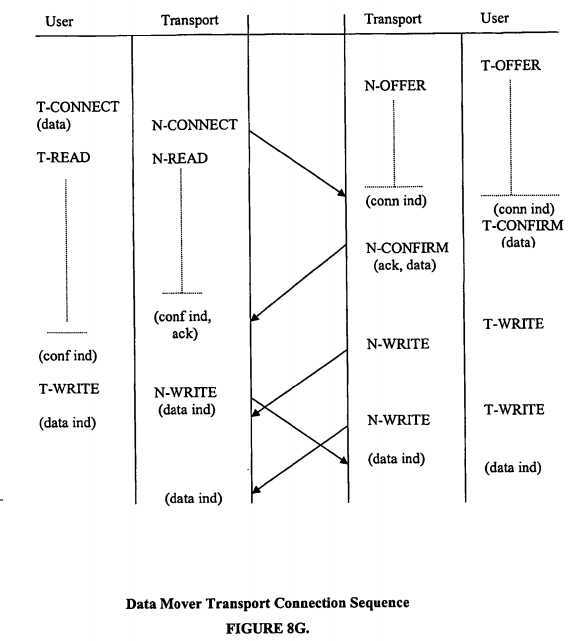
Connection Timeout and Alternate Path Retry. One of the capabilities provided by the Transport Service is the ability to divert traffic over a totally independent Network connection without causing a loss of service to the Transport user. If Transport detects that all communications have ceased on the existing Network connection, it will N-Disconnect the failing connection and attempt to N-Connect using the next PAM (Physical Address Map) provided in that list of PAM‘s passed to Transport at T-Connect time. If the N-Connection succeeds, then the transport connection will continue as normal. If it does not, then all PAM‘s in the list will be tried until the end is reached. If the last entry fails, then the Transport user will receive a Disconnect Indication indicating that the connection has been lost.
Alternate path retry is basically the responsibility of the Transport entity that first initiated the connection by accepting a T-CONNECT request from the packet driver. It is the responsibility of the connecting side to try all possible Network connections to the destination Transport process. It is the responsibility of the other (offering) side to simply wait until sufficient time has elapsed for all paths to be tried, or until input arrives from the connecting side.
The explicit actions taken by alternate path retry on the offering side and the connecting side are:
Offering side. If a transport process originally began with a T-OFFER, it will continue to transmit Idle messages every IDLETO seconds (if it is not sending data messages), and will not take other action until TMSGTTO (FIG. 7B, 806) seconds expire with no response of any type from the destination side. At that point, the connection has been lost; the Transport Service informs its local packet driver of the loss with a 2400 NRBSTAT error code. If a Network message containing a Connect Indication does arrive during that time, it considers retry to have succeeded. It then sends a Transport message (either an Idle or some data) using the N-CONFIRM service. Transport will continue to send N-CONFIRM responses until a message with a normal Data Indication arrives. At that point, it will N-WRITE all subsequent Transport messages.
Connecting side. The initiating Transport service will continue to send Idle messages every received TMSGITO (FIG. 7B, 805) seconds and will not take action until DEADTO seconds have elapsed with no response whatsoever from the destination Transport Service. Then Transport will N-DISCONNECT the original Network path and N-CONNECT on the next PAM entry. The N-CONNECT data will contain a Transport Idle message or possibly Transport Data. Once the new path is selected, the Transport process will continue to try this new path for CONTO seconds, sending Idle messages with an N-CONNECT request every IDLETO seconds. During this whole time, it leaves an N-READ outstanding. If data arrives with a Network Confirm Indication within CONTO seconds, it considers the new path to be good. If no data is received from this new path within CONTO seconds, then the next path in the list of PAM‘s is selected. Once again an N-DISCONNECT and a new N-CONNECT is issued and the Transport service waits CONTO seconds for the connection to complete. Transport will continue to try new paths until all paths in the PAM list originally provided with the T-CONNECT have been tried with no response whatsoever from the destination side. Transport is able to "wrap around" a PAM list and retry earlier paths in the list if successful alternate path retry took place earlier in the history of the connection.
FIG. 8H illustrates the connection re-establishment sequence that occurs after a network outage. Both sides lose proper connection at about the same time. The offering side is prepared to receive a new connection at any time. The connecting side waits DEADTO seconds for a response, then tries a connection on a new Network path.
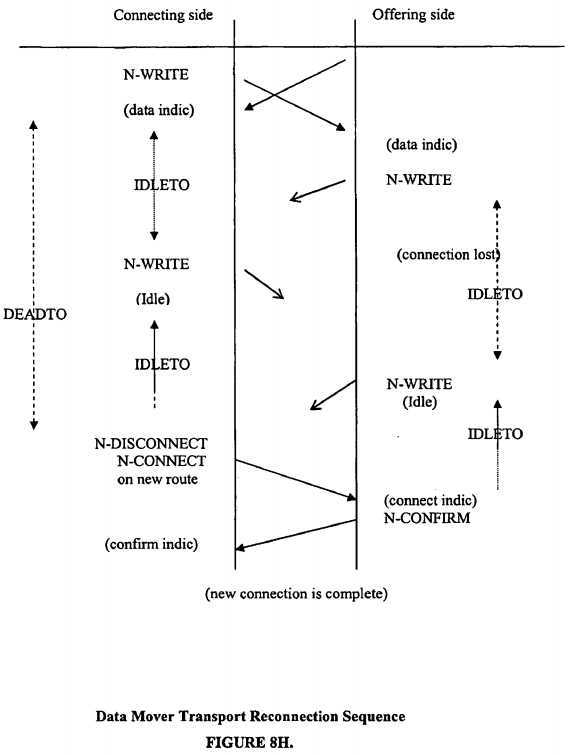
Message Size Negotiation. It is the responsibility of the Transport service to determine the maximum size of data that should be sent over the network at any one time. Most of these functions are performed by the Network service.
There are four factors that determine the maximum amount of data that may be sent with any single transmission initiated by the Transport service. They are: (a) any physical limitations on size posed by the network media; (b) the maximum amount of data acceptable by the destination Network service; (c) the maximum amount of data acceptable by the local Network service; and (d) the "voluntary" declaration of transmission input and output maximums by the Transport packet drivers.
Although the Network service will determine the actual maximum sizes that may be transmitted based on these four factors, it is the responsibility of the Transport service to observe these size limitations and segment the data accordingly. When the connection is first being established (T-CONNECT and T-CONFIRM requests are being serviced), the amount of data is limited to what can fit in a single Network Write request; after that point, data sent with T-WRITE and T-CLOSE requests must be segmented by the Transport Service and reconstructed on the destination side.
Segmentation of User Data. There is no inherent limit on the amount of data that a Transport user may send and receive with a single request. It is the responsibility of the Transport service to break a large buffer into several "segments" that are suitable for transmission over the media controlled by the Network Service. To accomplish this, the data is broken into "segments", each of which is small enough to be delivered by the Network service. Each segment contains a new, incrementing Logical Block Number as discussed earlier. The last segment of a buffer contains an "end" flag which indicates that the buffer is to be delivered to the user. When all segments have arrived, they are presented to the destination packet driver. Segmentation of data is only supported with the WRITE and CLOSE services. Data sent with CONNECT, CONFIRM, and DISCONNECT requests must be smaller than or equal to the maximum block size determined by the Network service. Segmentation applies only to the Pdata provided by the Transport user; Odata is not segmented.
Transport Close Facility. Either party of a connection may issue a T-CLOSE request at any time that a T-WRITE is valid. Once a T-CLOSE is issued to the local data mover, only a T-READ or T-DISCONNECT may be issued. The data provided with a T-CLOSE may be of indefinite length, just like the T-WRITE; thus the Transport Service must perform block segmenting on a T-CLOSE request.
When it is the appropriate time to present the block of data written with the T-CLOSE to the destination packet driver, it is presented with a Close Indication in the data mover NRB. At that time, the destination packet driver knows that it will receive no further data (with the possible exception of a Disconnect Indication) from the packet driver that originally issued the T-CLOSE. The destination packet driver continues to leave a T-READ outstanding in the event that a Disconnect Indication may need to be presented.
After the Close Indication is received, then the destination packet driver may continue to T-WRITE blocks of data to the packet driver that sent the T-CLOSE indefinitely. The T-CLOSE transmitter will continue to issue T-READ requests to accept the data. When the T-CLOSE destination has reached the point of sending all relevant data to the transmitter, it will issue a T-CLOSE of its own, which may contain data in the same manner as the previous T-WRITEs. When the T-CLOSE is marked complete, then the connection is terminated from the destination‘s point of view. If a T-READ is outstanding at the time that the second T-CLOSE is issued by the destination, then it will terminate with no indication in NRBIND,?0?status in NRBSTAT, and no data received.
When the side that transmitted the original T-CLOSE receives a Close Indication, then the connection is fully closed from its vantage point. No other requests against that connection, including a T-DISCONNECT, will be accepted.
T-CONNECT.
The T-CONNECT request is used to establish a transport connection. It initiates the establishment of a connection to another destination Transport application (packet driver) that has issued a T-OFFER request. When invoked, Transport service will establish a Network connection to the destination TPO and send it messages to establish the connection. It will send information that will allow data to flow in an orderly, full duplex manner between the sending and receiving packet drivers.
When the T-CONNECT is issued, the packet driver specifies two buffer lengths and addresses—one for Pdata and one for Odata. The Odata is always sent and received in the "octet" (8 bit byte) format. The maximum amount of Odata that may be sent is dependent on values generated during system generation on both the local and destination copies of the data mover.
The parameters used in the data mover Network Request Block for the T-CONNECT request are as follows:
The results of the completion of the T-CONNECT are: (a) NRBSTAT/success/failure code; (b) NRBIND/set to zero; (c) NRBBLKO/maximum transmission Pdata size; (d) NRBBLKI/maximum reception Pdata size; and (e) NRBMXRAT/maximum transmission speed of path.
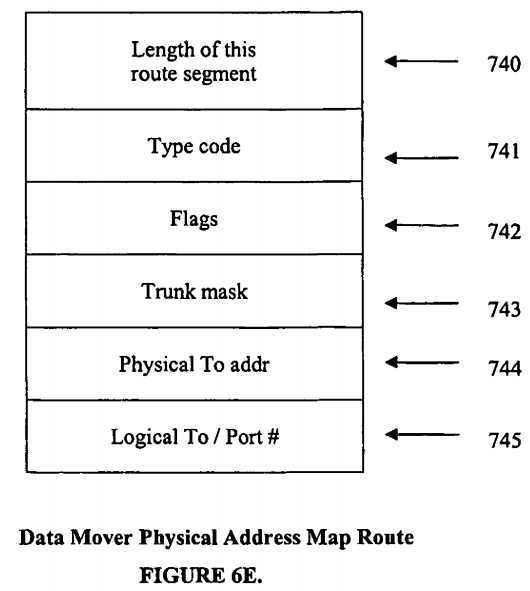
T-OFFER.
The T-OFFER request is used solicit and incoming Transport connection. It does this by a process that wants to establish a "passive" connection—to wait for another or "active" party to request that the connection be completed. It is a read-type request in the sense that it remains outstanding until an incoming T-connect indication arrives, and that data sent by the destination T-CONNECT will be used to fill buffers specified by the T-OFFER.
The parameters used in the data mover network request block for the T-OFFER request are as follows:
The results of the completion of the T-OFFER are: (a) NRBSTAT/success/failure code; (b) NRBIND/contains Connect Indication; (c) NRBLEN/length of incoming Pdata; (d) NRBPROTL/length of Odata received; (e) NRBNREF/N-ref assigned to this connection; (f) NRBBLKO/maximum transmission Pdata size; (g) NRBBLKI/maximum reception Pdata size; (g) NRBMXRAT/maximum transmission speed of path; (h) NRBCONN1/first PAM used to connect; and (i) NRBCONN2/connector‘s N-ref.
T-CONFIRM.
T-CONFIRM is issued to complete the transport connection. The offering Packet driver does this in response to a successfully completed T-OFFER. It signals the intent of the offering packet driver to go ahead with the connection, and to have data sent back to the originating packet driver. Either T-CONFIRM or T-DISCONNECT must be issued in response to a successful T-OFFER; any other request will be rejected. A T-CONFIRM is not valid at any time other than immediately after the T-OFFER. T-CONFIRM is a write type command and both Odata and Pdata may be sent back to the originating packet driver.
The parameters used in the data mover Network Request Block for the T-CONFIRM request are as follows:
The results of the T-CONFIRM completion are: (a) NRBSTAT/success/failure code; (b) NRBIND/set to zero; (c) NRBBLKO/maximum transmission size for connection; (d) NRBBLKI/maximum received size for connection.
T-READ.
The T-READ is a request that solicits an indication data or for a connection status Indication. It does this by informing the data mover that the packet driver is ready to process additional input from a Transport connection. In general, such input will be a Data Indication of some type, indicating that data has arrived from the destination packet driver. However, it can also be a Disconnect Indication indicating that the connection has been lost. One of the purposes of the T-READ is to allow the application to accept incoming data at a constrained rate; however, it is essential that a T-READ be issued to service incoming data on a timely basis. The data mover Transport service places a time interval limit (read timeout, referred to as READTO) which causes a connection to be terminated if no T-READ is issued to receive an incoming indication within READTO seconds of elapsed time. In addition to Odata and Pdata, the T-READ request will complete with an "indication" in NRBIND, which indicates the type of Transport request that was issued to send this data. A Confirm, Data, Close, or Disconnect indication may be received along with its associated Odata and Pdata.
The parameters used in the Data Mover Network Request Block for the T-READ request are as follows:
The results of the T-READ completion are: (a) NRBSTAT/success or failure code; (b) NRBIND/contains Connect Indication; (c) NRBLEN/length of incoming Pdata; and (d) NRBPROTL/length of Odata received.
T-WRITE
The T-WRITE request is used to send data to the destination packet driver. It is used when a connection is fully established to send Odata and Pdata to the destination packet driver. When issued, the T-WRITE completes as soon as transport has accepted responsibility for the data. The data will be delivered correctly and in order as long as the connection remains intact.
The parameters used in the Data Mover Network Request Block for the T-WRITE request are as follows:
The results of the completion of T-WRITE are: (a) NRBSTAT/success or failure code; and (b) NRBIND/set to zero.
T-CLOSE
When either side of a connection determines that it has only one block or no more data to send, it may gracefully terminate a Transport Connection. To do this it issues a T-CLOSE request. The T-CLOSE is a write type request and may have data associated with it. The T-CLOSE follows the same rules as WRITE requests. After the CLOSE is issued, the issuer may not issue any more WRITE type requests except DISCONNECT. The issuer may continue to read data indefinitely.
All pending written data is provided to the destination packet driver in order of transmission. The last data item received will have a Close Indication associated with it. No further reads will be accepted for this connection. The destination packet driver may issue any number of WRITEs to the originating packet driver. When the destination packet driver has no more data to send, it issues a CLOSE (with optional data). At that time, the connection is terminated from the vantage point of the destination packet driver. The originating packet driver will receive all data written by the destination packet driver in proper order. The last data received will contain a Close Indication. When the Close Indication is read, the connection is terminated from the viewpoint of the originating packet driver.
The parameters used in the data mover Network Request Block for the T-CLOSE request are as follows:
NRBPROTA and NRBPROTL contain the address and number of octets of Odata to be sent to the destination packet driver.
The results of completion of a T-CLOSE are: (a) NRBSTAT/success or failure code; and (b) NRBIND/set to zero.
T-DISCONNECT
When either side of the connection determines that the transport connection must be abruptly aborted, it may issue the T-DISCONNECT request. The T-DISCONNECT is a preemptive service in that all reads, writes, and data buffers in progress are discarded. If a packet driver issues a T-DISCONNECT, then the T-READ request (if any) that is outstanding will terminate with an error in NRBSTAT. Any further attempts to issue requests against the connection will be rejected. The destination packet driver will continue to receive any data in progress until the destination packet driver‘s Transport service detects the incoming Disconnect Indication. Any connection indications waiting to be delivered to the packet driver will be discarded; the next T-READ will complete with a Disconnect Indication, a normal status in NRBSTAT, and the Odata and Pdata supplied by the originator of the T-DISCONNECT. Disconnect service is different from other requests in that delivery of the Disconnect Odata and Pdata is NOT guaranteed. Such data may be lost in such a way that the local Transport service cannot be sure if it was delivered or not. The T-DISCONNECT is valid at any time in the lifetime of the connection that a Write-type request (Confirm, Write, Close) may be issued. It is also valid following a T-CLOSE request. In all cases data may not be sent to the destination packet driver but the connection will be terminated.
The parameters used in the data mover Network Request Block for the T-DISCONNECT request are as follows:
The results of the completion of a T-DISCONNECT: (a) NRBSTAT/success or failure code; and (b) NRBIND/set to zero.
Network Layer Services
The Network service interface is designed to supply a means of transmitting datagrams over any Internet Protocol (IP) media. It is responsible for establishing a communication path between two TPOs, constructing the messages that are needed to send data between them, and remove routing information before presenting incoming data to the Network caller. The network layer also performs all the multiplexing for the TPOs—the process of sorting out incoming messages by unique identifier (N-ref), and passing the information to the Network caller (i.e. Transport level).
The Network Layer interfaces with the Driver Layer, which subsequently interfaces with the IP stack by issuing UDP socket calls. Network service includes connection negotiation parameters, as well as a Read/Write and a Disconnect facility. Network service is distinguished from the higher layers of communications software in that it is simply a delivery facility for "datagrams" and makes no promises of successful delivery of any data.
The function of the network level protocols is to package a read or write type request containing Pdata and Odata into one or more network messages. In addition, it issues the messages required to establish a point to point connection between two TPO units.
The Network user packet driver issues an N-OFFER or N-CONNECT, depending on whether it is the requester or server in a connection. The N-OFFER packet driver supplies data buffers to hold incoming data sent with the connecting packet driver‘s N-CONNECT. The N-CONNECTing packet driver may specify data to be delivered to the OFFERing packet driver. The N-CONNECT caller provides a data structure (the Physical Address Map, refer to FIGS. 6C, 6D, and?6E) containing the particulars of the route to be followed to reach the OFFERing packet driver. The Network layer issues whichever Driver network messages are needed to establish the N-connection and analyzes their response (if any). The Network layer then transmits the data provided.
When the N-OFFERing side receives an N-CONNECT indication, it responds with an N-CONFIRM request that completes the connection. This CONFIRM request may contain data that can be read by the connecting side.
An N-WRITE request results in the construction of a network message that is sent along the path established by the N-CONNECT. The Network caller only provides the data to be delivered; the packaging of the data into network messages is handled by the Network Layer. An N-WRITE request completes as soon as it is signaled complete by the Driver Layer. Errors detected by the driver will be reported as equivalent Network errors. Data delivery by the Network layer is not guaranteed; Network completes responsibility for transmissions as soon as it leaves the local network interface.
An N-READ request is a request to accept data issued by a matching N-WRITE. Upon completion of the N-READ, buffers will be filled with the data provided by the N-WRITE caller.
An N-DISCONNECT will cause the network resources acquired to maintain the connection to be freed. Any pending messages in the network will be lost. No indication is provided to the Network user on the other side—it is assumed that the corresponding packet driver will issue its own N-DISCONNECT.
The embodiments of the TPO therefore contains a method of forming TPO messages that include Network Protocol data for the purpose of communicating with the peer-level Network layer on the destination side of the TPO network.
N-CONNECT
The N-CONNECT request is used to establish a Network Connection path to another TPO, in other words, to a process that has issued a corresponding N-OFFER request. Network service will issue whatever protocol messages are needed to establish the paths needed to communicate between the two TPOs. When the path is established, it delivers the data provided by the packet driver to the destination packet driver, and the Network connection is then fully established.
The parameters used in the Data Mover Network Request Block for the N-CONNECT request are as follows:
The connecting Network level user may specify two buffers of data to be sent to the destination application. Odata is intended for protocol use and should be 256 octets or less in length.
A field in the NRBREQ word specifies if control should be returned to the caller as soon as any required message transmission is begun, or if control is to be returned only after the connect is complete.
The address of the process on the network that it is to be connected to is provided in NRBCONN1. The NRBCONN1?field is the address of a data structure provided by the Network user called the "Physical Address Map" or PAM. This PAM is a description of all the physical paths to be followed to reach the desired destination, as well as the characteristics of the nodes and links between the two hosts.
The Network connection is matched with a specific other N-connection through the use of two N-ref (connection identifier) fields. Each of these two fields is sixteen bits in length. Both the connecting parties place the connection identifier N-ref of their own local process in the NRBNREF field of the NRB. They place the N-ref of the destination side in the NRBCONN2?field of the NRB. Normally for the connection to take place, both sides must specify a matching, complementary pair of N-ref‘s. The side issuing the N-OFFER has the option of specifying a zero in NRBCONN2, which implies that an N-Connect with any incoming destination N-ref is acceptable. In that case, the N-ref received will be placed in NRBCONN2?when the request completes. The value of the local connection N-ref in NRBNREF must be unique within the entire local data mover.
Two fields are used to inform the Network layer of the maximum amounts of Odata and Pdata that are to be used to send and receive data in this connection. These limits are dependent on many things: the buffer capacities generated in both the local and destination copies of the data mover, and the physical limitations of the media connecting the two TPO units. When a following N-READ completes with a Confirm Indication, then these fields will have the actual limits for Odata and Pdata size in the connection sent to them. The Network Service will return the maximum that is available if the caller‘s size request is not available. It is then the responsibility of the caller to scale its buffer sizes downward accordingly.
The maximum size of Pdata is specified in addressable units; the maximum amount of Odata is specified in octets.
When invoked by an N-CONNECT, the Network layer will issue whatever lower level messages and functions are needed to establish a communication path through the intermediate nodes specified by the PAM. Once a clear path to the destination TPO unit exists, it will transmit the Pdata, Odata, and PAM provided by the user to the destination TPO unit. The N-CONNECT completes as soon as this data transmission completes locally. Delivery of the connect data is not guaranteed. To determine successful delivery of the connect data, network applications should specify a timeout on the first N-READ following the N-CONNECT to verify that the Network application on the destination TPO unit has sent a response within a reasonable time. If no such response is received, then the local Network application should issue an N-DISCONNECT to free the connection resources followed by another N-CONNECT to the same destination. This process may continue until it is reasonably certain that the destination TPO unit or an intermediate node is "down" or does not have a matching N-OFFER request.
On completion, NRBMXRAT will contain the maximum data transmission rate that can be sustained through the connection. Generally this will be the speed of the slowest link. The speed is expressed in 1000‘s of bits per second.
The results of completion from an N-CONNECT are: (a) NRBSTAT/success or failure code; (b) NRBIND/set to zero; and (c) NRBMXRAT/maximum transmission speed of path.
N-OFFER
The N-OFFER request solicits an incoming N-Connection. It results in the allocation of device resources needed to take part in an N-connection and causes the appropriate device driver to wait for incoming data. An N-OFFER completes when an N-CONNECT request from another TPO unit arrives or the N-OFFER request times out. Initiation of an N-OFFER request begins with the caller providing two buffers for input—a feature that will be continued in the higher data mover layers. If the length of either or both of the buffers specified is zero, then incoming data for that buffer type will be discarded and NRBSTAT will contain an error code reflecting the loss of data.
The parameters used in the data mover Network Request Block for the N-OFFER request are as follows:
The results of the completion of an N-OFFER are: (a) NRBSTAT/success or failure code; (b) NRBIND/has Connect Indication; (c) NRBLEN/length of Pdata received; (d) NRBDMODE/-datamode of Pdata received; (e) NRBMXRAT/maximum transmission speed of path; (f) NRBBLKO/maximum send/receive Pdata size; (g) NRBBLKI/maximum send/receive Odata size; (h) NRBPROTL/length of Odata received; (i) NRBCONN1/PAM information from connector; and (j) NRBCONN2/incoming N-ref from destination TPO unit.
N-CONFIRM
Whenever an N-OFFER or N-READ has been successfully completed and so indicated by a Connect Indication, the Network Connection must be completed. The N-CONFIRM request is issued to accomplish completion of the network connection. The N-Confirm request is very similar to the Write request. If the local Network caller does not wish to communicate with the connecting side, then it may issue an N-DISCONNECT to avoid further conversation with that side. Note that whenever data is read, a Connect Indication may arrive. Generally, this will be due to the fact that the other side detected a complete failure in the path between the two TPO units and issued another N-CONNECT over a different route. The party receiving the Connect Indication must respond with an N-CONFIRM before proceeding.
The parameters used in the data mover Network Request Block for the N-CONFIRM request are as follows:
N-CONFIRM is supplied with two data buffers, as with an N-CONNECT.
The Network layer will construct a message or messages to be introduced on the network and will transmit them. The request is complete when all data associated with the N-CONFIRM has been successfully sent on the network.
The results of completion of N-CONFIRM are: (a) NRBSTAT/success or failure code; and (b) NRBIND/set to zero.
N-WRITE
After a Network connection is established (either side has either issued an N-CONFIRM or has received a Confirm Indication), either end of the connection may transmit data to one another through an N-WRITE request.
The parameters used in the data mover Network Request Block for the N-WRITE request are as follows (as with N-CONNECT, two data buffers are supplied with N-WRITE):
The Network layer will construct a message or messages to be introduced on the network and will transmit them. The request is complete when all data associated with the N-WRITE has been successfully sent on the network. Any number of N-WRITE requests per connection may be outstanding at one time, although the Network layer may opt to force the application to wait for some to complete before accepting any more write requests.
The results of the completion of an N-WRITE are: (a) NRBSTAT/success or failure code and (b) NRBIND/set to zero.
N-READ
The N-READ request is used to solicit an indication from the Network. It signals the Network layer that the Network application is prepared to accept additional data (and indications) from the connection. It is the responsibility of the Network software to achieve maximum effectiveness of the use of the communications hardware, so the data may often be "read" before the application requests it. The N-READ request also provides a mechanism for the Network layer to signal special events such as connection termination to the network application. For example, if the Network layer detects an unrecoverable communications loss in the connection, then it will schedule a Disconnect Indication to be "read" by the next N-READ after all correctly received data has been delivered.
The data mover Network Request Block for the N-READ request works as follows:
The application provides a set of data buffers and a timeout value for the N-READ request.
If the Network layer has data ready to present to the Network application, then the request completes more or less immediately with the data supplied by the oldest received message for that data. Not all data that is written is necessarily received by the destination packet driver; data that does arrive is not guaranteed to arrive in the order of transmission.
If no data is currently available for the application, then the request will wait until data arrives. If no data arrives to satisfy the N-READ request in the time specified by NRBTIME, then the request will complete abnormally. If such a timeout occurs, the connection will remain complete; subsequent N-READs may be issued against the connection.
Any number of N-READs may be outstanding against a single connection. If the total number of N-READs outstanding becomes excessive, the Network layer may force the Packet Driver to wait until some of those read requests become complete. Any number of N-WRITE‘s may be issued while the N-READ remains outstanding, allowing full duplex communications to take place.
Since a disconnection is not signaled to both ends of a Network connection, it is possible for one side (generally the one that issued the original N-CONNECT) to issue an N-DISCONNECT followed by an N-CONNECT to the same N-ref. In that case, the inactive side will not see the disconnect indication; when the N-CONNECT arrives, the current N-READ will end with a Connect Indication in NRBIND, the new PAM used to reach this destination in a buffer pointed to by NRBCONN1, and connect data. This allows one side to establish a new communications path in the event of a failure without involving the other side. Note that when this subsequent connect takes place both the local and destination N-ref‘s must match on the destination end; otherwise the data will be discarded.
If the Network layer detects loss of communications, then it will do so by completing an N-READ with a Disconnect Indication. All data successfully received will be used to satisfy previous N-READs before the Disconnect Indication is presented to the Network application. If the Network Layer is the one that originally issued the N-Connect, then it will make a best efforts attempt to free the network resources allocated to the connection before returning the Disconnect Indication to the packet driver. After the Disconnect Indication is provided, all resources for the connection are freed and no further requests against that connection will be satisfied.
The results of completion of an N-READ are as follows: (a) NRBSTAT/success or failure code; (b) NRBIND/incoming Indication type; (c) NRBLEN/length of Pdada received; (d) NRBDMODE/datamode of Pdata received; (e) NRBPROTL/length of Odata received; and (f) NRBCONN1/new PAM if connect arrived.
N-DISCONNECT
When a Network application determines that no further communications with the destination application is desired, it may terminate the connection with an N-DISCONNECT request. N-DISCONNECT simply frees the resources that were originally allocated by the N-CONNECT/N-OFFER originally issued by each side. If the issuer of an N-DISCONNECT was the application that originally issued the N-CONNECT, then the Network layer will free the network path that was allocated during the connection process. Any N-WRITE messages that have not yet been received by the destination TPO unit may be lost. After the network resources have been freed, the Network layer will free the local resources needed to maintain the connection; when this is done, the N-DISCONNECT will complete. Any further requests against that connection will be rejected. Any requests against that connection which were outstanding at the time the N-DISCONNECT was issued will complete with an error. If the issuer of an N-DISCONNECT was the application that originally issued the N-OFFER, then the Network layer will only free the local resources needed to maintain the connection; the N-DISCONNECT will then complete. Any further requests against that connection will be rejected. Any requests against that connection which were outstanding at the time the N-DISCONNECT was issued will complete with an error.
The parameter used in the Data Mover Network Request Block for the N-DISCONNECT request is NRBNREF.
The result of the N-DISCONNECT is contained in NRBSTAT/success or failure code.
Driver Services
The driver layer interfaces with the IP stack by issuing UDP socket calls and is used for sending and receiving network messages in and out of a Network Interface Card. Connecting to the driver establishes a "path" from the data mover to the network interface hardware. Since the packet driver interfaces with the data mover at the Session Layer, the usage of the Driver Layer only occurs as the result of packet driver Session calls going down the protocol stack from Session to Transport, then to Network, and finally to the Driver Layer.
Protocol Message Descriptions
Driver Protocol Format
The Driver Protocol fields are located at the start of the data mover protocol data. FIG. 5 illustrates the format of the Driver protocol message. It consists of the following fields:
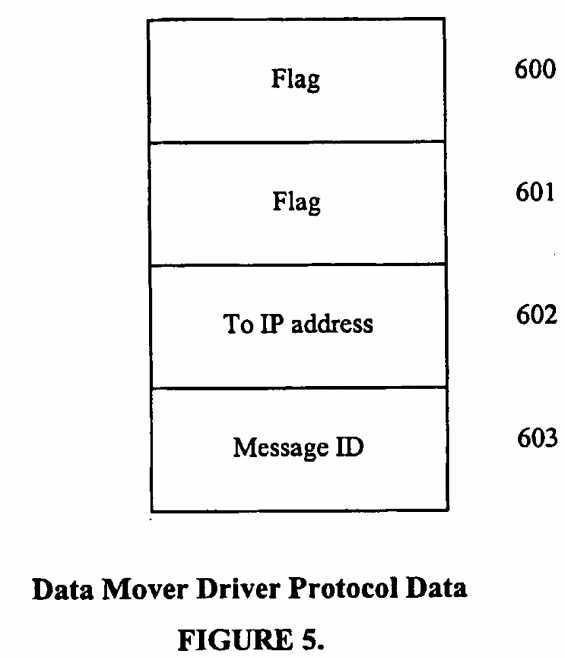
Network Protocol Format
Network protocols are located immediately following the Driver addressing information. The F2 message ID is the indication to the Network layer of the start of Network Data. Network level protocol consists of a fixed field, followed by an optional Connect field that is sent when connections are first made. All of these fields are present in every Network level network message.
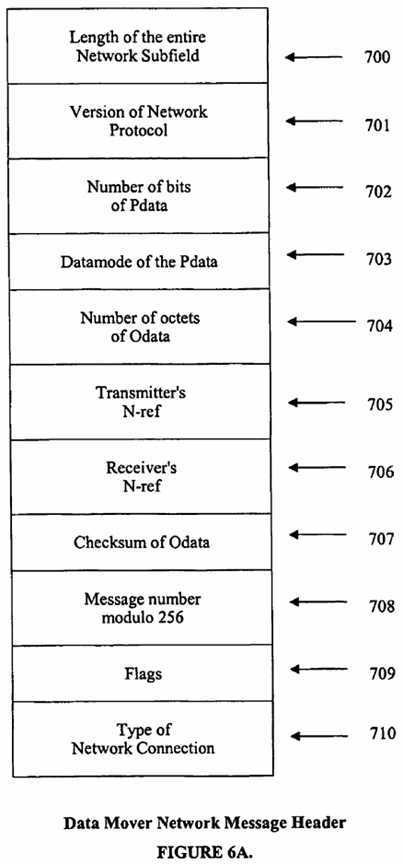
FIG. 6A illustrates the format of the Network message header. It consists of the following fields:
N-CONNECT, N-CONFIRM Protocol Data
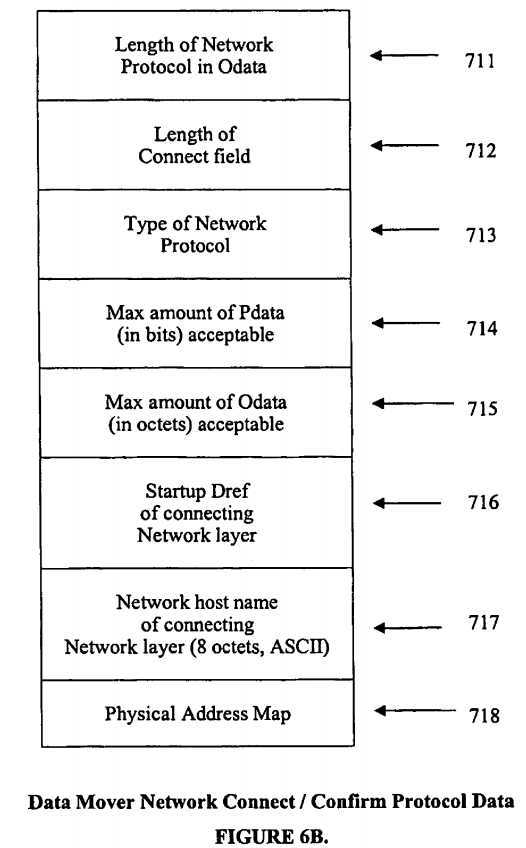
FIG. 6B illustrates the content of the Network Connect subfield of the TPO Network protocol data.
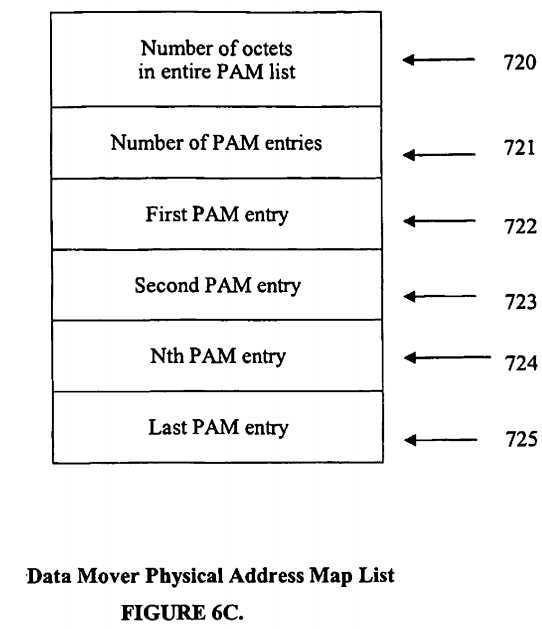
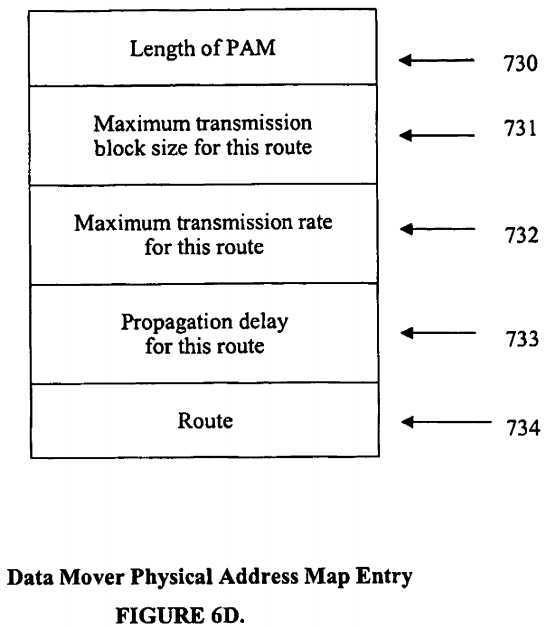
FIG. 6D illustrates the content of entries in each of the Physical Address Map entries.
Transport Protocol Format
Transport protocol consists of two types of fields of Odata. Present in every message sent between Transport services is a Transport Base field, which contains information common to all Transport transactions, and Transport Subfields which contain information specific to a certain Transport activity such as connection, data transfer, acknowledgement, etc. Any number of subfields may be found in a single Transport message. The types of subfields encountered are:
CONNECT. This contains information so that the two transport processes can begin a connection and exchange information about the other that will be common throughout the lifetime of the connection. Generally (though not always) this field will be sent with user T-CONNECT and T-CONFIRM requests.
DATA. This field describes the data that is being delivered to the destination application. It contains such information as the amount of application Odata, block numbering information, segmenting information, and the like.
ACK. The ACK field is a mechanism for exchanging information about the "state" of the destination transport mechanism. It contains information on blocks received and flow control information. It is present in all messages, and is also sent as an "idle" message if the connection is unused for awhile.
CLOSE is a special form of the Data subfield that indicates a T-CLOSE has been issued by the application.
DISCONNECT indicates that a disconnection is to be performed. This may be caused by the application issuing a T-DISCONNECT or a data mover detected termination condition (such as user program termination.)
Transport Fields
Transport Base
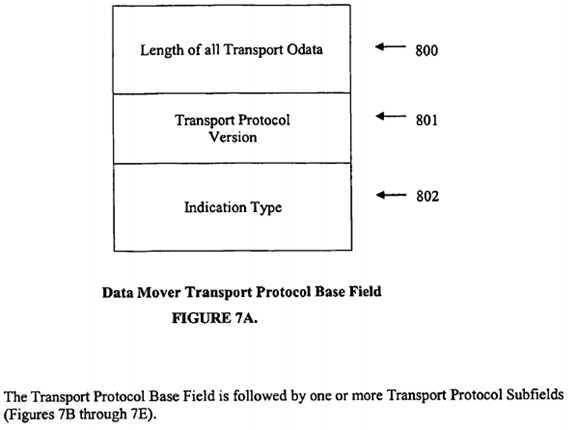
FIG. 7A illustrates the content of the Transport Base subfield. It is present in every message sent by Transport service. The content of the Transport Base subfield is:
A data field associated with this message will contain the data supplied with the T-CONNECT. A Connect transport subfield will be present. A Connect Indication will be placed in NRBIND of the destination application‘s T-OFFER request.
Connect Subfield
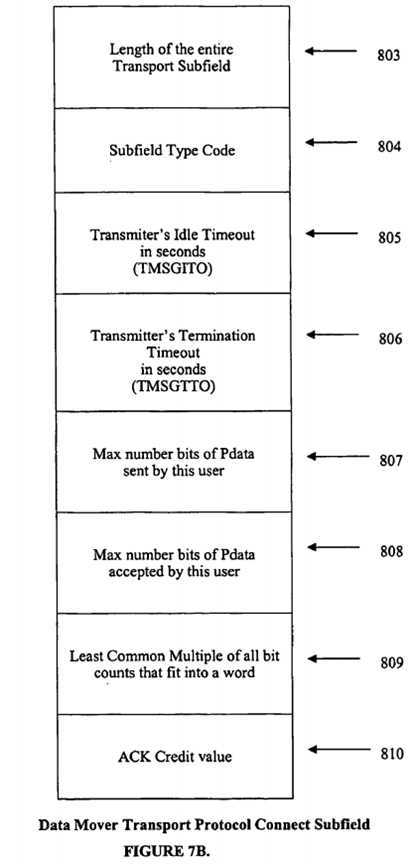
FIG. 7B illustrates the content of the Transport Connect subfield that is located in a TPO message. This subfield contains the information needed to correctly exchange information between the two Transport processes for the lifetime of the connection. It covers such things as timeout thresholds, segmenting information, and maximum user block sizes. The content of the Transport Connect subfield is:
Transport Protocol Data Subfield
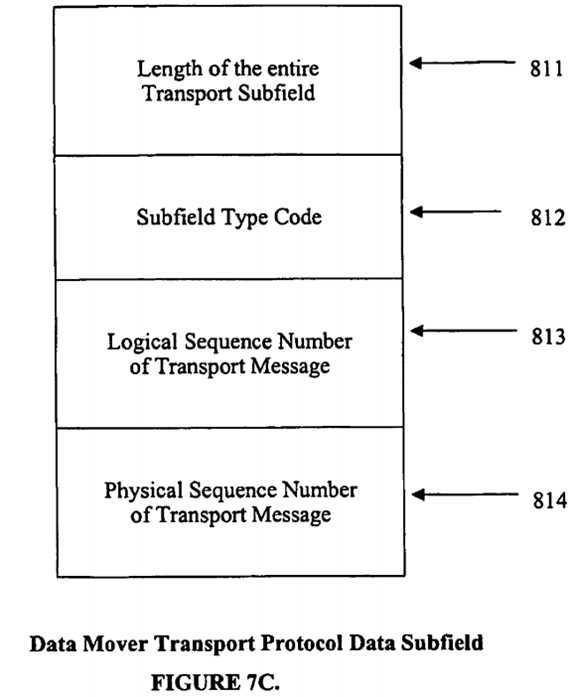
FIG. 7C illustrates the content of the Transport Protocol Data subfield. This subfield describes the Odata and Pdata supplied by the transmitting Transport application. The content of the Transport Connect subfield is:
Transport Protocol Acknowledgement Subfield
This field is used to report to the opposite party the "state" of the transport process what has been sent before and what has been received. By examining this field, the other transport party can determine what has been successfully sent, whether the other party can accept more data (flow control), and if blocks were recently sent which did not arrive at the destination (lost block detection). This field is present in every Transport message, whether or not the Ack credit is exhausted. This allows the transmitter of information to free storage for successfully transmitted blocks on a more timely basis, and improves network performance in environments where acknowledgements can be lost.
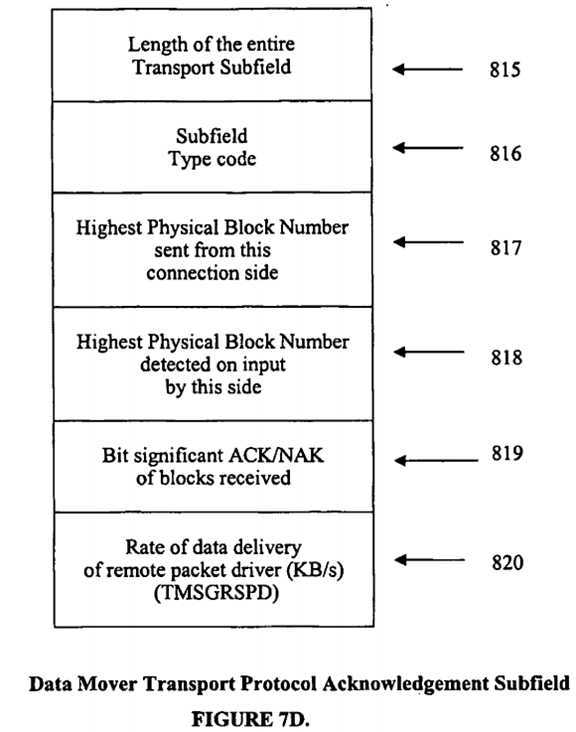
FIG. 7D illustrates the content of the Transport Acknowledgement subfield located in the Transport portion of a TPO message. the content of the Transport Acknowledgement subfield is:
Idle Messages
An "idle message" is defined as a message containing no application data which is exchanged between the two transport processes. It contains only a single Transport protocol subfield, the Ack subfield. Its purpose is to inform the destination transport process of the continued presence of the connection, and to permit the retransmission of any data that may have been lost. There are three main circumstances where a Transport process should send an idle message:
When data is arriving from the destination Transport process and the Ack Credit supplied with the last Ack subfield provided by the destination party is exhausted. Furthermore, the local Transport process has no data to send. In "one-way" applications such as file transfer, the destination Transport process will generate an idle message every "ack credit" times an incoming data message is received.
When the local Transport process has not had occasion to transmit anything (including another idle message) for the time interval that was specified by TMSGTO in the last Connect subfield received from the destination transport. Since both sides of the connection are performing this transmission, they can detect loss of communications with the other side of the connection by the failure to receive idle messages for an extended time. In addition, a burst of errors or a small Ack credit may cause both sides to think all is well when in fact one or more recent transmissions may have been lost. The exchange of timed idle messages will inform the transmitter that data was lost so that retransmission may take place.
When the flow control mechanism implemented by TMSGPROC must be used to tell a transmitting process that a "buffer full" condition in the destination has been relieved. If a pair of applications work so that the transmitter is faster than the destination, then the destination Transport process‘ buffers will fill and a value in TMSGPROC will be returned so that the transmitting Transport process will introduce no new data on the network. At a later time, the destination application will free buffers on the destination side by accepting data. When the number of buffers holding data drop below a threshold determined by the destination Transport process, then it will send an idle message back to the transmitter with a higher TMSGPROC value. The transmitting Transport process can then send several more blocks and the process will continue.
Transport Protocol Disconnect Subfield
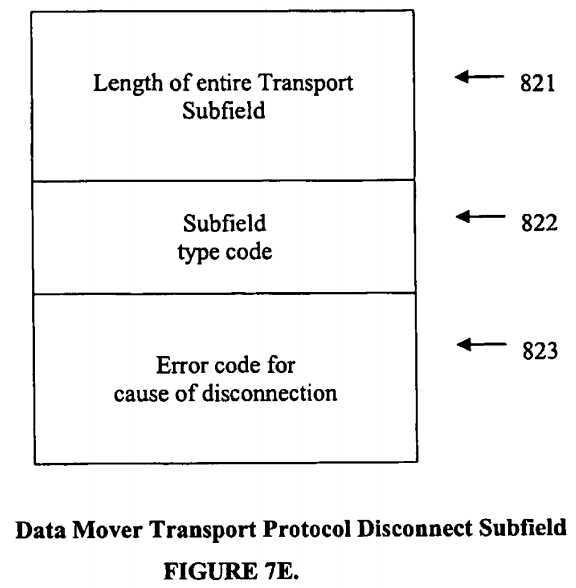
FIG. 7E illustrates the content of the Disconnect subfield located in the Transport portion of a TPO message. The Disconnect Subfield is sent whenever a Transport process is unilaterally shutting down and wishes to inform the destination Transport process of the fact. It will be the last message transmitted by the side initiating the Disconnect. Any subsequent messages arriving at the Disconnecting side will be discarded. The purpose of this subfield is to inform the Disconnected (destination) Transport process of the reason for the disconnect. The content of the Disconnect subfield is:
All communications between Transport processes will contain one or more of these Transport subfields. Table 1 shows what sort of subfields can be expected with the various types of Transport messages and indications.
?
?
TABLE 1 | |||||
| ? | |||||
| ? | |||||
Transport Subfields | |||||
Message Type | Connect | Data | Ack | Disc | Segment |
| ? | |||||
CONNECT | Req‘d | Req‘d | Req‘d | Never | Never |
CONFIRM | Req‘d | Req‘d | Req‘d | Never | Never |
DATA | Option | Req‘d | Option | Never | Option |
CLOSE | Option | Req‘d | Option | Never | Option |
DISCONN | Never | Option | Option | Req‘d | Never |
IDLE | Option | Never | Option | Never | Never |
| ? | |||||
| |||||
| |||||
# Network connection was lost and a new one was established. The offering Transport process would then get a Connect Indication on its N-Read, along with a Transport message containing normal data and possibly a new Connect subfield to reflect changing parameters in the new Network connection. | ? | ? | ? | ? | ? |
| |||||
| |||||
| |||||
| |||||
| |||||
Session Protocol Format
Session Manager Protocol
Session Protocol is the Odata that is included by Session service for communications purposes. It consists of a base field that is present in all Session messages, as well as subfields that are used to communicate with the Session Manager.
Session Manager Protocol Base Field
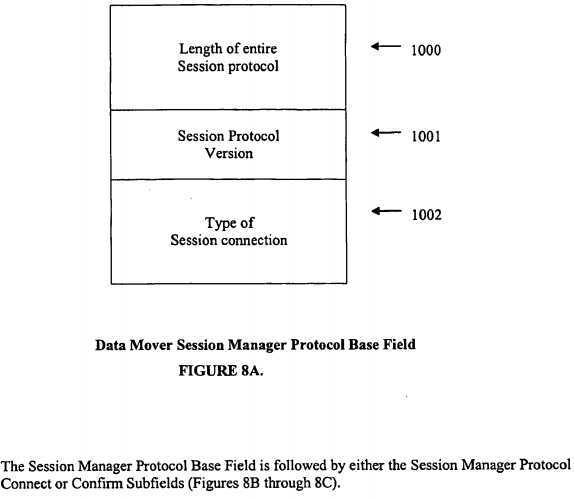
FIG. 8A illustrates the content of the Session Manager Base subfield. As with the Transport protocol it contains a header with total length and version number followed by a protocol type indicator. The content of the Session Manager Base subfield is:
Session Manager Connect Protocol
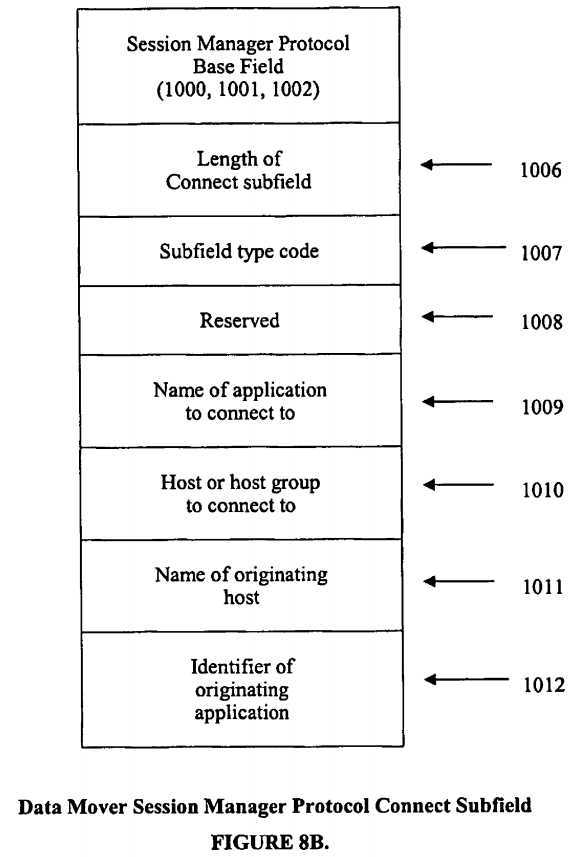
FIG. 8B illustrates the content of the Session Manager Connect subfield, including the Session Manager Base subfield. This information is sent on the behalf of an application that has issued an S-CONNECT. It is a request for a Session Manager to complete a connection to an S-OFFERing application. Four alphanumeric eight character strings are supplied to match sessions and supply information about the connecting party. All transmissions of this character data over the network must use the ASCII code. Any ASCII character values are acceptable for application and host names. The content of the Session Manager Connect subfield, including the Session Manager Base subfield is:
Session Manager Confirm Protocol????
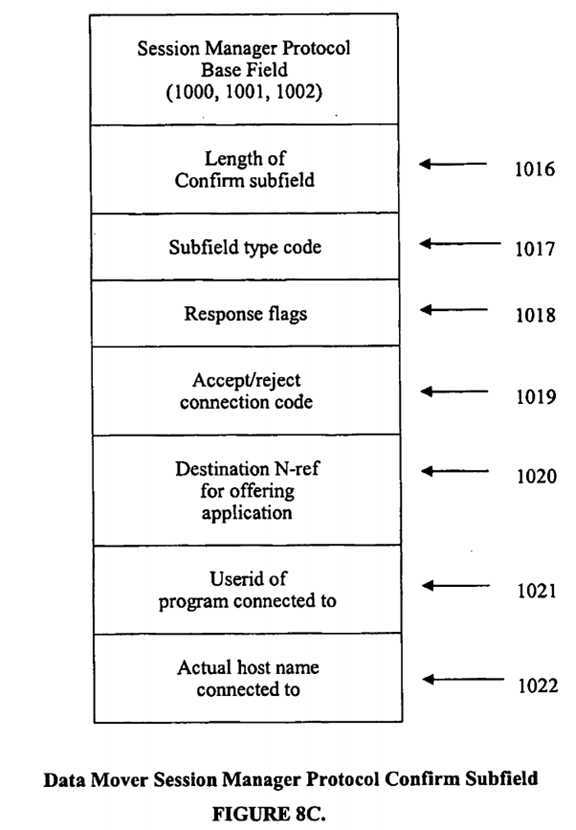
FIG. 8C illustrates the content of the Confirm subfield, including the Session Manager Base subfield. This information is sent on the behalf of an application that has issued an S-CONNECT. The confirm protocol is used when the Session Manager wishes to return information back to the connector. It will inform the connector whether the connection had a matching offer or not, as well as giving information on the route to be followed to reach the offering application. The response to a connect request comes in one of three sizes depending on the nature of the response. 1. If the connection did not succeed, a reason code is returned that details the reason for the failure. In this case SPLEN=5. 2. If the connection did succeed and the PAM used to connect to the Session Manager is also suitable for connection to the user application, then the N-ref of the application is returned and the connection application can use the Session Manager PAM and the application N-ref to establish the application to application connection. 3. If the connection succeeded, but the PAM used to connect to the session manager is not appropriate to connect to the application, then the Session Manager can return a complete list of PAM‘s, suitable for passing directly to Transport Service with the application to application T-CONNECT request. The meanings of the various fields are:
PAM list is optional. Following the Session information in the response is an optional PAM list, in the same form as is provided to a T-CONNECT request. This PAM is returned in a form that can be directly used to establish communications with the application that issued the S-OFFER. This field can be produced by modifying the incoming PAM that T-connected to the Session Manager, or it can be produced by generating a list of routes between the two applications based on the Session Manager‘s knowledge of the network.
Session Manager Disconnect Protocol
No Odata is associated with a Disconnect request to the Session Manager. The Session Manager will re-offer itself as soon as the first connection is terminated for whatever reason.
Session Service Protocol
Session Service Protocol is the Odata that is included by Session service for communications purposes after the two Session applications have established a direct T-connection between one another. It consists of only a base field that is present in all Session messages. No subfields are present, as Transport provides all the services that are needed in this version of Session protocol.
Session Service Protocol Base Field
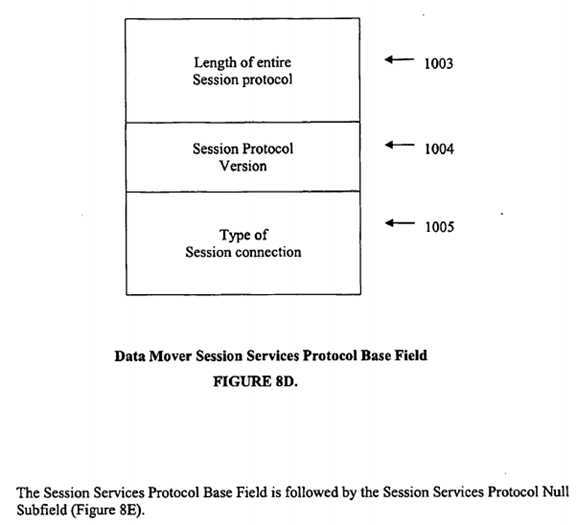
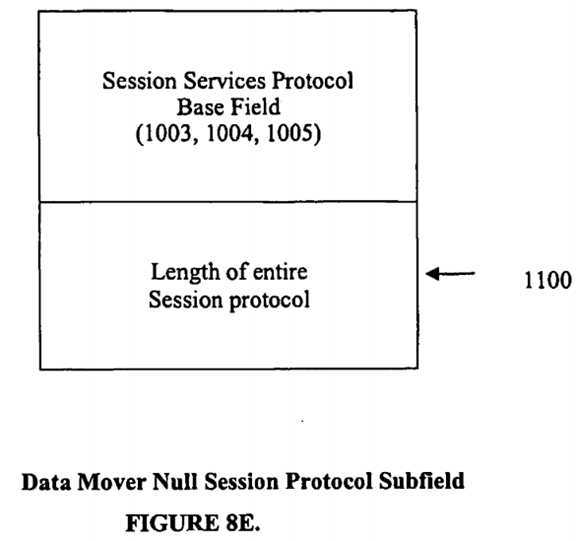
FIG. 8D illustrates the content of the Session Service Base subfield. As with the Transport protocol it contains a header with total length and version number followed by a protocol type indicator. The content of the Session Service Base subfield is:
Abbreviated Session Protocol field
Normally, there is little or no session protocol to be sent in a TPO non-connect type message. Optionally, an abbreviated form of session protocol can be used, as illustrated in FIG. 8E.
Application Protocol Format
Embodiments of the TPO contain a method of forming TPO messages that include Application Protocol (i.e. packet driver) data for the purpose of communicating with the peer-level Application layer (i.e. packet driver) on the destination side of the TPO connection. FIG. 9A illustrates the format and contents of the TPO packet driver application data. It consists of the following fields:
The Message Header and data contents sequence can be repeated up to the limits of the available space in the buffer.
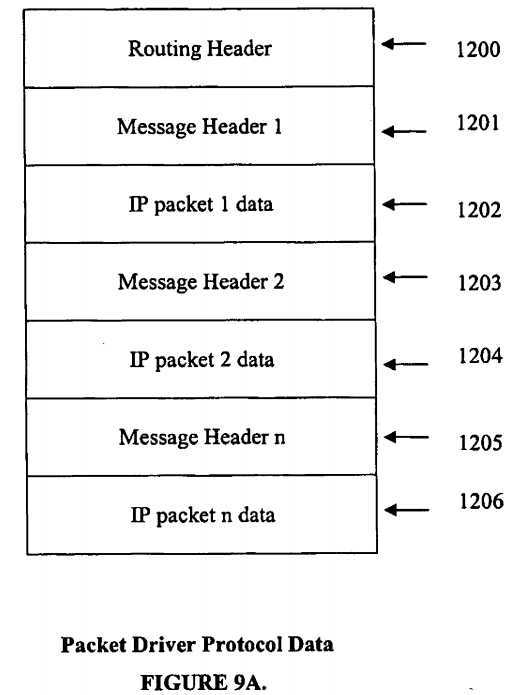
FIG. 9B illustrates the contents of the TPO packet driver Routing Header. It consists of the following fields:
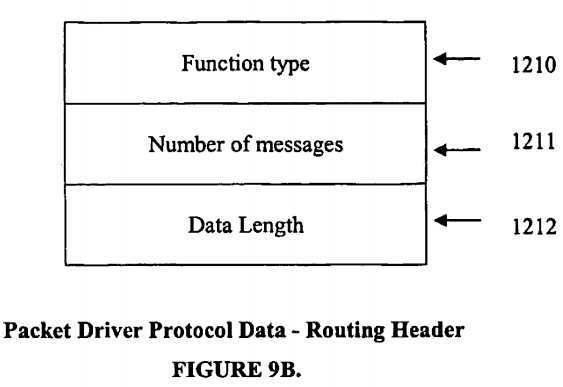
FIG. 9C illustrates the contents of the TPO packet driver Message Header. It consists of the following fields:
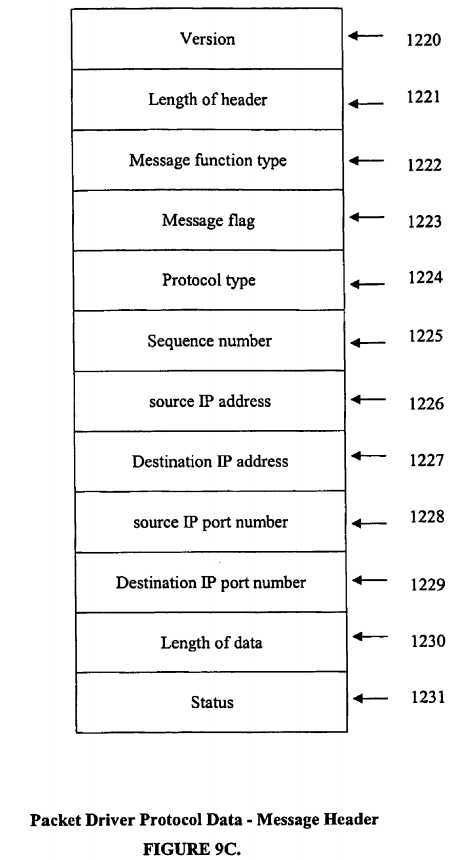
Length of this header?1221?specifies the length of this Message Header.
Collectively, fields?1226,?1228,?1227,?1229, and?1224?are referred to as a "quintuple".
Thus a transport protocol optimizer for optimizing the end-to-end throughput of data transported over TCP/IP networks is provided. One skilled in the art will appreciate that the invention can be practiced by other than the described embodiments, which are presented for purposes of illustration and not limitation, and the present invention is limited only by the claims that follow.
SRC=http://www.freepatentsonline.com/y2007/0110046.html
Internet protocol optimizer,布布扣,bubuko.com
标签:des style blog http color strong
原文地址:http://www.cnblogs.com/coryxie/p/3853786.html